#my essays
Explore tagged Tumblr posts
Text
For the past few years I've been enchanted by the idea of the divine as intrinsically horrific and dehumanizing, but not in the usual assumption (pun intended), where the intrinsic dehumanization and horror comes from something like "A god looked at me and I turned into stone" or "I, a mortal, looked at a god and got turned into a laurel tree".
I've been thinking about it in the opposite direction. Where being a god is intrinsically horrific and dehumanizing.
To put it another way: I've been writing a lot from the perspective of divinity where the god experiences godhood in the way a haunted house experiences househood. You were created by mortals for comfort, for condolence, for safety, for sympathy. You were built with all the care and special attention to ensure that you would last a long time--longer than your inhabitants would live, but that's fine, because they'll leave you descendants.
Except you, unlike the average house, have a brain. Have hands. Have a stomach which can hunger but never starve. You cannot die, but you know what death is. You see humans and raccoons and spiders and trees and rocks and everything else in this whole world die all the time, but it will not touch you.
How many years do you think it takes before your mouth starts to salivate like your gut's gone sour? How many endings do you have to witness before you begin to stop caring when things you paid attention to die? How many times do you hear your name contort and twist under the weight of different empires' languages before you stop recognizing it as yours anymore, and cease answering when they call?
How long does it take before you stop being capable of interacting with the rest of the world in a way that a person can understand, can safely comprehend, would ever want to experience?
And how much of that, do you think, do you let happen on purpose, because the alternatives were all too much to even begin to imagine after one too many mountains turned to sand before your eyes?
5K notes
·
View notes
Text
As someone who took Cinema as their Major, I find it funny how some people dismiss stares as 'nothing important', when they are the most important aspect of communicating feelings.


When Sonic sees Shadow for the first time, some people say "it's just shock, nothing else".
Or you could say it's admiration; and admiration is a form of love.
There are also tones of other shock moments in the movie: like when Shadow messes with the gang and pretends to be a ghost, which are played for laughs.


And yet no one is going to misinterpret that stare for anything else other than shock / panic.
There's also a serious moment when Sonic realises what happened to Tom and stares at him for a very brief moment, then runs to him.


And no one is going to misinterpret this as anything else but pain and anguish.


But the moment someone stares 'lovingly' then it's 'not what it seems' or 'you're just making things up'.
194 notes
·
View notes
Text
The XuanWu Cave Scene is basically Lan Zhan absolutely losing it
Lan Wangji really just saved Wei Ying's life, screamed at Wei Ying, shoved him like thrice, told him not to flirt with people if he doesn't mean it, bit him like a dog, cried, told him to shut the hell up and that he is a fucking menace, took his underrobe, then apologized to him twice sincerely, then told him not to over think anything, then saved his life, then made him rest and grill him upon his sleeping schedule, then antagonize him, then stroke his hair while he's sleeping and let him roll about in his lap, then be angry at being called boring and then sing a song he'd written for Wei Ying to profess his immense love for him.
like
lan wangji is a fucking 13 year old teenage girl in love with that one popular guy in school. he's LOSING his goddamn mind. it's on "red hot alert" and alarm bells screeching in his head.
#canon lan wangji#lan wangji#wangxian#mo dao zu shi#mdzs#wei wuxian#mdzs meta#my meta#my thoughts#my essays
2K notes
·
View notes
Text
Exploring Kurosawa's internalized homophobia and compulsive heterosexuality
oh yea baby we bustin out the Big Words for this one 😎

This was supposed to be posted at the end of pride month but Life happened and it got delayed a lot 😩 So yea happy pride month (and happy birthday Kurosawa I guess 😂)
(btw I think I've never mentioned this on any of my other posts but english is not my first language, so if anything I write ever sounds awkward, that's probably why 😅) (also I had to merge a bunch of images to get around the image limit, this post is really long, the word count is at 1930 words 💀)
Hope you guys enjoy the read! 💞
Spoilers for anything up to vol 11
Let me start this by saying that there's no actual textual evidence of Kurosawa being gay (rather than bi/pan), so this interpretation is definitely veering towards headcanon territory. I'm also not trying to establish this as the only Correct opinion and anyone is of course allowed to have their own sexuality headcanons, this is very healthy and valid 👍
Kurosawa's internalized homophobia
The first scene I want to put under a magnifying glass is this one.

Let's examine what's going on here: Kurosawa has just tried to kiss Adachi, whose hesitation he perceived as disgust. Then he pretends it was disgusting for him too, because he thinks that is the average reaction anyone would have, extending this to Adachi as well. The way he says "who'd be into that?" is already lowkey homophobic, but the japanese line makes it even more evident: "普通嫌だよな" (= "Normally, you'd dislike that right?"). Keyword here being "普通" = "normal, ordinary", implying that anyone who would like that is abnormal. So what does that say about him then, who was so happy to get the chance to kiss another man? This is pretty much textbook internalized homophobia, where he has accepted what he perceives to be the general opinion on gay people and has made those values his own, hating himself for it (albeit only briefly here), which is why he internally apologizes to Adachi.
This is not the only instance of him feeling like that, although this next part is slightly more speculative than the more obvious example above.
So we all know that Kurosawa is a jealous, jealous man. It's one of his defining character traits and it's often the source of conflict and comedy alike. But he does not express his jealousy equally across genders. With men he has this strong rivalry where he needs to prove himself better and more worthy of Adachi's attention.


But with women he has a different approach: gently coaxing them away from him, lest they realize what a catch Adachi really is.

So, why this difference? The answer I have is that he doesn't actually believe he can compete with a woman. If Adachi wants to be close with a man, Kurosawa thinks it might as well be him, he's the best option after all. But if Adachi wants a woman, he cannot offer anything and is therefore the inferior option. He believes this even after he found out Adachi's not completely repulsed at the idea of being with a man. Even if Adachi's okay with men, he'll always prefer a woman.
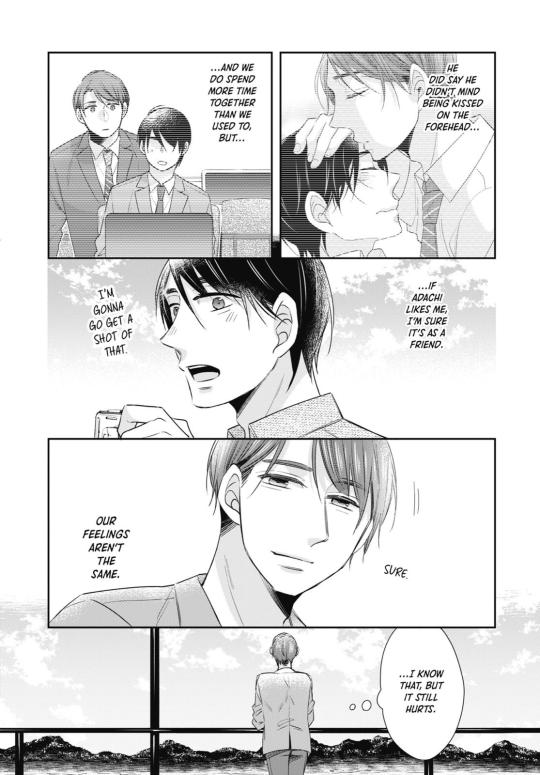

And whenever he imagines anyone else with Adachi, it's always a woman, specifically Fujisaki, which he believes is "his type".
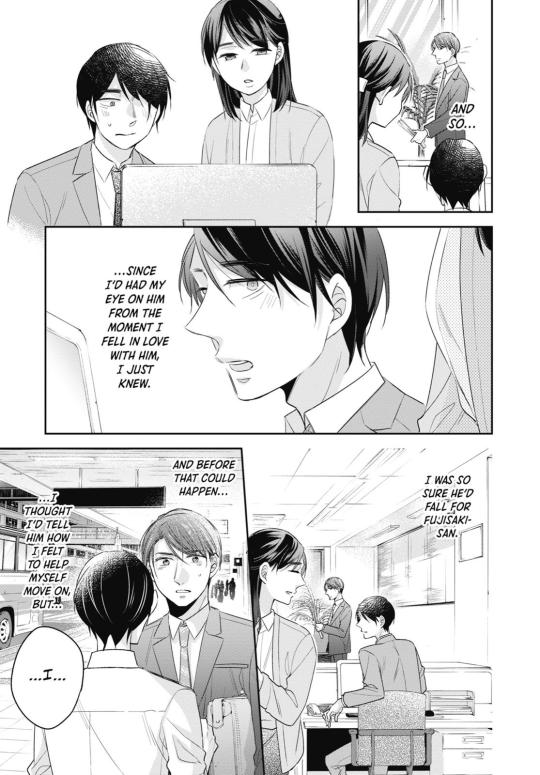

And he at least thinks he's very far away from that ideal. (He's not but that's a topic for a different essay.) If anyone's wondering why he even bothers at all then if he's so sure that a woman will out-compete him, I think the lyrics from the anime opening actually put it best, specifically the last verse:
I have these impatient feelings I doubt this love will come to fruition But still I can't give up this happiness There's a feeling here I can't resist A love like a castle in the sky
So basically, his plan is that he might as well ride the high of his first ever crush as far as it will go, intercepting where he can to prolong it just that little bit further, until it all inevitably comes to an end. (a castle in the sky = an unreachable dream) This plan kind of fluctuates throughout volumes 1-3 as Adachi gives him a bunch of mixed signals, but it holds true most of the time.
Adachi's side
Now I'd like to highlight the way Adachi actually thinks about their relationship, because it serves as a great contrast to Kurosawa's assumptions about him.
Throughout the first three volumes we see him grapple with his newfound feelings for Kurosawa, but he (almost) never puts his gender at the forefront of his musings. The manga makes it very clear that it's his lack of romantic experience and low self esteem that make it hard for him to accept Kurosawa's affections, and not the fact that he's a man.

This second page here being his own little gay awakening, where he realizes that he is not, in fact, disgusted by intimacy with a man.
It's also worth mentioning that when he later introduces Kurosawa to his parents (ch 41), they are immediately welcoming of him, suggesting he grew up in a very tolerant environment.
And it's not like he's completely unaware of heteronormativity/homophobia either, especially after he does his research in vol 8, but he is slightly more defiant in responding to it.


(I love how he just buys that bag he probably doesn't need that's supposed to come with all the wedding magazines, just as this very tiny act of rebellion.)
So now that we can see how different Kurosawa's thought patterns are compared to Adachi's, the next question we should ask ourselves is: Why is he like that?
Heteronormativity in Kurosawa's life
(yes we're finally getting to the comphet part of the essay 😂)
First let's look at the environment he grew up in. There are not many scenes with his family, but from those that we do have, we can at least make some assumptions about how he must've been raised.


His mother is clearly the authority figure in his life, judging by how she's described as "strong" and how terrified he is at her merely setting down a teacup (while Adachi has a more mild reaction). Her reaction to the news of them dating and Kurosawa expecting his parents to go as far as disowning him for it would suggest that she might just be generally homophobic.


But when they actually go meet her we see this slightly more nuanced perspective.
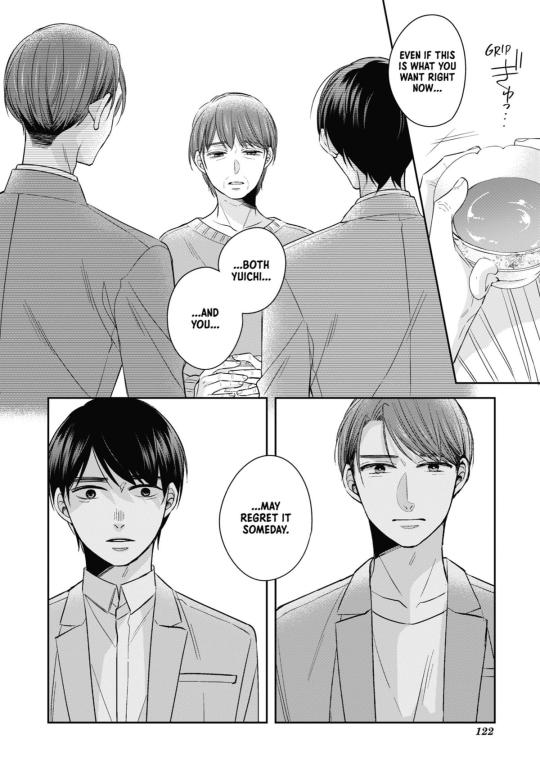

She's not entirely against it, but she does believe they are making a mistake by choosing to be together, hence why she thinks they might "regret it". There's many hardships that gay couples in Japan face, some of which we even see discussed in the manga, so it's not hard to see why she would be concerned for her son. The way she talks about Kurosawa never causing any problems, but "changing" ever since he fell for Adachi further supports that conformity is what she believes will ultimately lead to a successful, happy life. And that's also why she accepts Adachi later, when he's made it abundantly clear in his speech that they are happier in this non-conforming relationship than they were without it.
To contrast, her other child Mari is shown to have a very progressive stance (see: her pep talk in ch 47) and it would not surprise me if that is the reason she's rarely in japan and is never seen together with her family, save for the one time they're all at the wedding. She might find the conforming environment too restrictive and preferring to keep her distance. (shoutout to naina for this bit 🙏)
So that's Kurosawa's family situation. Now let's check how his social circle holds up.
From what we see of his friends, they never even seem to consider him possibly being with a man.

And his work environment seems rather toxic to say the least.

It clearly dictates traditional gender roles as the ideal. Nobody except Fujisaki even clocks any of Kurosawa's advances on Adachi as romantic in nature, even though he seems to be quite obvious about it (see: ch 34.5). And it's not like dating in general is discouraged at Toyokawa either, as we can see from all the women constantly vying for Kurosawa's attention.
From all this we can conclude that Kurosawa's upbringing and social/work environment is painfully heteronormative and until he falls for Adachi it seems he never questioned the status quo either.
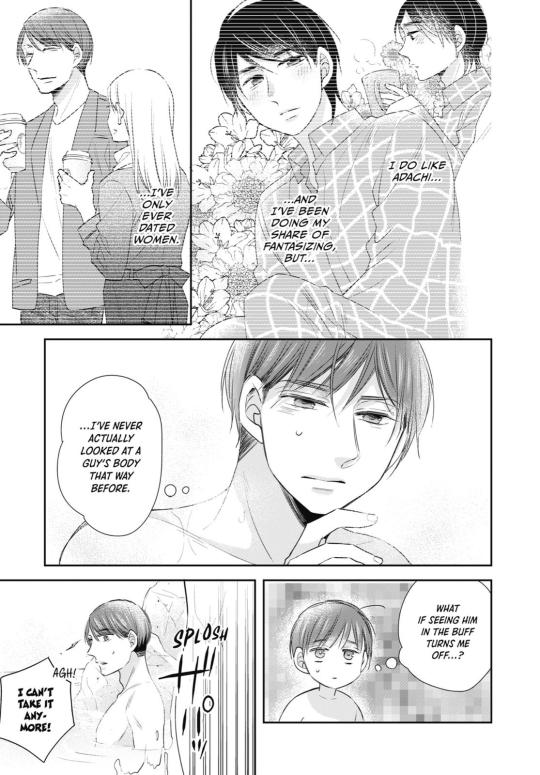

The famous onsen scene, while funny, also reveals the sad truth that Kurosawa, in his 30 years of life, probably never even had the chance to explore his sexual orientation, rather focusing on being "perfect" in his straight relationships.
Speaking of those relationships...

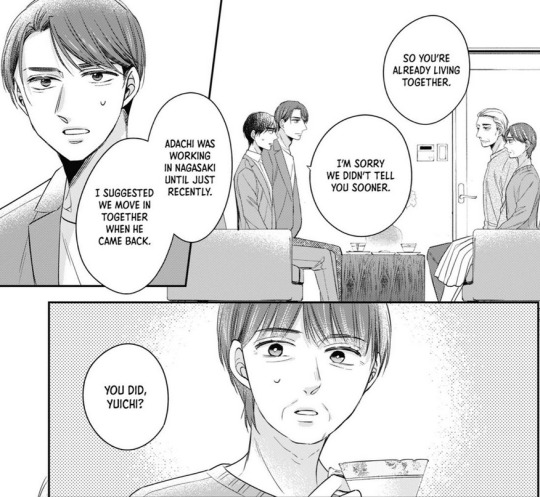
He apparently had a bunch of girlfriends, who all seem to have dumped him pretty early on. His mother's surprise at him expressing a willingness to commit also makes me think he's never brought anyone home either. He also only seems to have a surface level understanding of what a proper relationship is supposed to entail, if his idea of an ideal date is just "what the average person" thinks is romantic. So why were all of his relationships so short-lived? Before I answer that...
Intermission: Kurosawa's smiles
It has come to my attention that this is not common knowledge, so let me explain: There's a way to tell apart Kurosawa's fake smiles from his real ones, without any context clues, just purely visually.
Real smiles: (ch 23, 24, 37)

Fake smiles: (ch 5, 13, 32)

The difference being very simple: Blush = real, no blush = fake 👍 And before anyone mentions it: No he doesn't just blush when he's around Adachi, that last fake smile is actually directed at him. (ch 32)
Edit from the future: This holds true like 90% of the time, but as Toyota's art style becomes more detailed, this doesn't apply as much in the newer volumes. I think there's also new details added that I haven't quite figured out yet so take this bit with a grain of salt. (The images below are still from her early art style though.)
So now that we have this additional knowledge, let's take a look at every instance Kurosawa is paired with a woman.

He's smiling in all of these. Not a single one has a real smile in it though.
I think he's never actually had his heart in any of his relationships, and the girls probably noticed it and that's why they dumped him.
And, of course, the first time he actually falls in love...

... just so happens to be with a man.

Even his friends comment on this, who have known him since high school.
It's almost funny how perfectly this aligns with real life gay people. Having numerous, short-lived relationships with people of the "wrong" gender is one of the more common traits of compulsive heterosexuality. (source: me oof) (but also shoutout to the "Am I a lesbian?" masterdoc, google it if you don't know, it's truly eye-opening)
After dating Adachi
So we have already established that he's far happier when he does finally get to date Adachi, but do any of his other thought patterns change?
Honestly it seems like he throws every single reservation about being seen as gay out the window.
He starts bragging like crazy about his new relationship to anyone willing (and unwilling) to listen, he has no qualms about PDA, he marks Adachi up and down so everyone knows he's taken and the only thing stopping him from proclaiming his love for Adachi to the whole world is the still very much existing societal homophobia. But he is a lot more easy-going about it now than he ever was before.
And I think the best way to describe this mental shift is, hear me out, the date song from volume 4...

... specifically the last 2 verses as a whole, and this section in particular:
"I won't let anyone divide our fraction! You couldn't pry this thrill from my hands when they're cold and dead!"
Horrible lyrics aside, this perfectly encapsulates how Kurosawa simply couldn't care less anymore now that he finally has what he's wanted for more than a year, maybe even his whole life. All the societal pressure pales in comparison to the sheer euphoria he feels at finally having someone that he loves and who loves him back just as strongly, feeling cared for and seen like no one else ever did.
And, you know, just happens to be a man. 🏳️🌈
#cherry magic#my essays#this is the mother of all essays I've ever done jesus christ#this thing spawned like 8 other post ideas btw#can't wait to finally get to those lmao
259 notes
·
View notes
Text
I finished my mythology essay last night! This is the first paper I've successfully finished in two years, and I'm very proud of myself, even though I don't think it's probably all that good.
I'm going to link it below because I know some of you were interested. Please know though that it's about a theoretical perspective known as the myth-ritual school- I don't explain it in the paper, because I wasn't supposed to, which means that if you read the paper with no prior knowledge, you may be confused, but I think you should get the vibe.
Without further ado, I present something I hope is mostly coherent that I finished at 11:30 last night:
High Above the Altar: Medea and Agamemnon Through the Lens of Myth-Ritual
41 notes
·
View notes
Text
Dissecting Naruto’s Ending in Good Faith
Let's consider the possibility that Kishimoto's ending was deliberate—that things ended how they should've, and some plots weren't mistakes (looking at you, Kaguya).
Okay, hear me out. By assuming this, we can explore the series with a good-faith reading. Recently, I’ve been reflecting on the series as an adult, and it’s shaken up many of my beliefs and perceptions—it's somewhat distressing, so I’ve been processing all this in therapy too, and coming to key conclusions. I think It's crucial to understand the motivations behind Kishimoto's choices, not just within the Narutoverse but also within the Kishiverse. Why did he make the decisions he did?
Why did he suddenly introduce reincarnations and fate? Aliens? Why the couples that seemingly came out of nowhere? Why doesn't Naruto quite change the system, or help the Hyugas? The final arc, overall, just seemed quite jarring, with some plots (like fate) seemingly subverting the message of the series.
I wonder, then, if Kishimoto's ending shows more of a realistic world rather than an idealized one. Reality often unfolds messily and sadly, devoid of perfect resolutions. Whether intentional or not, Kishimoto's storytelling may reflect his acknowledgment of the imperfect nature of existence. His reality bleeds into his creation, and he's subject to the same harsh realities his characters face.
Fate, Justice, and Change
In this unideal depiction, Naruto and Sasuke's actions are tied to fate rather than free will, Sasuke doesn't achieve his revolution, Naruto doesn't dismantle the shinobi system, and both end up in marriages that seem sudden and unsatisfactory.
If Kishimoto indeed intended this, why? Well, change often takes time, and sometimes change doesn’t even happen at all. People can become tired of fighting for a cause in certain ways, and settle for smaller victories. Relationships may not always align with desires, leading to compromises for convenience.
It's intriguing that Kishimoto explores themes of defying fate while ultimately making Naruto destined to save the world anyway. By making even the protagonists constrained by destiny, Kishimoto echoes historical cycles of rise and fall. Perhaps there's something inevitable about human love and hatred. We can begin to see Kishimoto's philosophical musings on how the universe came to be—the First Cause theory, that there's a divine Creator behind the universe. Or, perhaps, no matter the circumstances or our destinies, we must try to make our own decisions.
And, Sasuke's lack of revolution may not be a complete surrender. He doesn't fully support the system, remaining detached from the bureaucratic and familial norms by traveling. He pursues justice by roaming the world as a vagabond, championing justice as a vigilante. Sasuke has never been one to adhere strictly to Konoha's rules; he eschews the headband and prioritizes loyalty to his morals and loved ones. His rebellion does not manifest as he initially envisioned because his youthful idealism inevitably wanes. But this doesn’t take away from his fight, because Kishimoto portrays him as insightful and intelligent, showing that Sasuke can recognize the pragmatic benefits of partial conformity. He forever remains committed to his pursuit of justice by traveling and aiding others. Thus, his true surrender lies in acknowledging that he can be loved without compromising his strength, refuting the notion of love as a weakness.
As for Naruto, he isn't ignorant—he does comprehend the situation fully, sharing a deep understanding with Sasuke that transcends words (“I know your heart, and you mine” telepathic conversations). While it doesn't seem like much has changed, the events in Boruto unfold merely two decades after Naruto's era, a short span in historical terms. Significant societal transformations typically require centuries, not mere decades. Nevertheless, Naruto succeeds in establishing an era of peace, which Kishimoto shows through the relatively low stakes in Boruto. And when there are threats, they often manifest on a cosmic scale involving gods and extraterrestrial beings. While Naruto and Sasuke have brokered peace among nations, they acknowledge the inevitability of conflicts and warfare. Naruto's focus shifts towards fortifying the system itself, striving for safety within the constraints of reality.
Unexpected and Reluctant Couples
To thoroughly analyze the series, we must also examine the role of romance, as Kishimoto's introduction of romantic pairings significantly impacts plot themes, character development, and motivations. Whether we embrace it or not, these pairings alter the essence of characters in ways previously unseen.
In the canon material (manga and anime main story only), Sasuke and Naruto exhibit no romantic interest in Sakura and Hinata throughout the series. In fact, neither actively pursues romance in general. Sasuke states as such to Kakashi, and Naruto tells Jiraiya he’s not interested in girls. While Naruto initially does have feelings for Sakura, he eventually relinquishes them. Both protagonists prioritize their ideological missions above all else, with exceptions made for their friendship with each other. Sasuke, for instance, abandons his vendetta against Itachi when he sacrifices himself for Naruto in the Land of Waves, while Naruto is willing to forsake his dream of becoming Hokage to die to save Sasuke from loneliness and hatred.
So, how does Kishimoto portray their eventual marriages? Sakura pursues Sasuke persistently, repeatedly confessing her feelings until he ultimately relents and agrees to a family life with her. Meanwhile, Naruto displays no romantic interest in Hinata, even disregarding her confession during the battle with Pain. When he eventually marries her and starts a family, it feels contrived and dispassionate, a jarring image contrasting the boisterous Naruto we know. These relationships seem to emerge out of duty and resignation rather than genuine affection. Both Sasuke and Naruto appear worn down by their wives' persistence, leading them to reluctantly accept their marriages.
These couples have sparked considerable debate within the fandom, and rightly so, because they are not healthy or truly romantic relationships; rather, the depiction reflects the harsh realities of many real-life relationships. Kishimoto portrays Naruto and Sasuke's marriages with little prior development; perhaps a deliberate narrative choice rather than an oversight, highlighting their dissatisfaction through their roles as absentee fathers.
And in terms of specifics, Naruto's marriage seems to revolve more around Hinata than anything else. Consider this: why is Naruto portrayed as uncharacteristically serious and subdued when interacting with Hinata? Even during the pivotal moment when he finally confesses his love to her, his demeanor remains stoic and solemn. Where is the goofy and expressive Naruto we know and love? Additionally, why does Kishimoto include comments from other characters urging Naruto to "treat her well"? Because Naruto's marriage is not primarily about him; Hinata simply happened to be there, and it’s his duty to follow up on that.
And for Sasuke, why do we see panels like the family dinner in Boruto where Sasuke appears utterly miserable? Why is Sasuke never around? Why didn’t Kishimoto even give them a kiss scene? Why does Sasuke mostly display emotions when he's engaged in combat or interacting with Naruto? It's because Sasuke finds purpose and vitality in fighting for his beliefs, and Naruto is the only character depicted by Kishimoto who truly understands Sasuke's innermost thoughts and feelings. Sakura doesn't get Sasuke's essence. Isn't a marriage supposed to be built on true understanding, and progression?
One way we can see it is, Kishimoto, as an artist, is deliberate with his drawings, and these details are not mistakes. Canonically, both Sasuke and Naruto are depicted as tired or subdued in their relationships. Despite Kishimoto drawing them blushing in various situations before, neither of them ever exhibits such reactions when interacting with their wives. This deliberate choice by Kishimoto, despite them being his beloved main characters, shows that Sasuke and Naruto are not in love with Sakura and Hinata.
Love and (lack of) Romance
Sasuke and Naruto are not portrayed as romantic individuals; rather, they are depicted as traumatized fighters and idealists driven by a desire to change the world.
Kishimoto remains true to this characterization throughout the series, extending into Boruto. While Naruto is largely a series about love, it's not focused on romantic love. Instead, it delves into the concept of transcendent love and optimism amidst adversity, encompassing love found in seeking revenge, striving to change the world, and fostering bonds of friendship and loyalty. The relationship between Naruto and Sasuke is the one Kishimoto gives the most development to in the series, and embodies nuances of love, rivalry, loyalty, and compromise. This love isn’t necessarily romantic, but it can also be anything because it is transcendent love. This part is up to you to decide and I believe doesn’t take away from their story either way.
Another question that arises is, does Kishimoto really just suck at writing romance? Well, not really. He’s demonstrated his ability to craft compelling romances, such as those between Minato and Kushina, and Asuma and Kurenai. However, he chose not to apply this to Naruto and Hinata or Sasuke and Sakura. Although, he does show that Sasuke cares for Karin at one point, even awakening a new power for her, but takes it back as their relationship ultimately falls victim to Sasuke's madness at the time (although I believe this relationship, along with Naruto x Sasuke, can tentatively be argued for, but I digress for now).
These decisions reflect 1) the fact that Naruto and Sasuke's characters are not about romantic love; their goals and convictions for justice are prioritized above all else 2) Hinata and Sakura are not The Ones for them. Thus, their seemingly unhappy relationships serve as a reflection of their de-prioritization of romantic love in favor of their greater missions.
Further, realistically, people don't always end up with their ideal partners. Many people settle in relationships because they desire families or because they are pursued by others, rather than actively seeking out their soulmates. Kishimoto chooses to depict Naruto and Sasuke with a lack of emotional expression with their respective spouses. Even in the presence of their own children, Naruto and Sasuke are not depicted with joyful expressions, suggesting a lack of fulfillment in their familial roles.
The Whitepill
Ultimately, the way things turned out seems disheartening at first because shows are meant to inspire and provide an escape from reality. Throughout the series, Kishimoto led us to believe in the possibility of an ideal ending, where change is attainable and love conquers all.
But, Kishimoto's decision to depict Naruto and Sasuke's inability to achieve 100% of what we desire is, in fact, profound. The truth is, we can't always get exactly what we want, but we can make small compromises and strive for justice in whatever ways we can. This struggle is something humanity has faced throughout its history. Our world is far from ideal. But, we are still able to achieve bits of justice in ways we can; we get just enough to keep us going, to leave us with the thirst for more.
Perhaps Kishimoto portrays Sasuke's surrender not because he believes Naruto is unequivocally right, but because Sasuke wants to choose love, and is inherently kind and idealistic. He cares deeply about his friend and desires to see positive change in the world. Sasuke's journey leads him to become a protector of not just Konoha, but all villages, reflecting his compassion for people everywhere.
Similarly, Kishimoto may depict Naruto continuing on as part of the existing system not because Naruto is complacent, but because he's someone who seeks to work within established frameworks rather than tearing them down completely. This approach doesn't diminish Naruto's convictions or his commitment to change; rather, it reflects his pragmatic approach to achieving his goals while minimizing disruption.
Naruto and Sasuke's best efforts serve as inspiration for us to take up the mantle and continue the fight.
Ideal World and Optimism
Despite this, Naruto’s ending does not really make sense in an ideal world. In an ideal world, there would be a more perfect compromise, we wouldn't be bound by our fate, and the oppressive shinobi system would be dismantled. Naruto and Sasuke would have more time to heal and explore the world alone, and eventually find fulfillment in their love lives; Sasuke would find someone who truly understands him, while Naruto would enjoy a relationship where he can be his true, expressive self. Sakura would be able to move past her childhood infatuation and grow personally, while Hinata would gain confidence and develop her own identity.
Therefore, reading from a purely Narutoverse standpoint, the issues I mentioned do, in fact, undermine the themes and relationships built over the course of the narrative. Maybe Kishimoto fumbled after all, and Boruto sucks, and is simply a cash grab. Or, he intentionally wanted to troll us—suddenly breaking all conventional storytelling rules is suspicious, right?
Perhaps what really happened is a mix of all these things. While there are many external influences that led to this bleak ending, Kishimoto's intentions surely play a vital role.
Regardless, Kishimoto's big mistake is being too subtle and abrupt in introducing the new concepts at the end. However, in doing so, he has successfully sparked ongoing disagreement and discourse that persists even a decade after the series concluded.
In this sense, he has effectively brought attention to the messages: make love, not war; seek change, not complacency; and find The One, don’t settle. And even if I’m wrong in everything and this whole essay is just a copium, it's a lot better to believe in my ideals than to accept defeat. Because, Naruto taught me one invaluable lesson—no matter the odds, never give up.
#thoughts#I finally broke and wrote down all my thoughts#naruto meta#meta#naruto#sasuke#konoha#naruto ending#naruto analysis#essay#naruto essay#pro sasuke#pro naruto#anti sasusaku#anti naruhina#media analysis#writing#mine#op#my essays
187 notes
·
View notes
Text
How Do Spy's Disguises Really Work? [TF2 Lore]
This is NOT a tutorial nor guide on how to use disguises in the game. This is a Team Fortress 2 essay about Spy's ability to disguise, how it works in-universe, and some implications we can deduce through it.
(This essay contains spoilers for the TF2 comics Old Wounds and The Naked and the Dead, and the Valve animation, Meet the Spy.)
Note: As of the time of writing, issue 7 of the comics has not been released.
Point 1) The Disguise Kit's Backstory

The Spytron 3000 is the personal device assistant Spy uses to disguise as the other 8 mercs. This name is listed in TF2's official website's page for Spy, while in-game, it's named as the Disguise Kit in your inventory. We also see the name Spytron 3000 printed on the model in-game.
The Disguise Kit is made to look like a cigarette case, and Spy keeps his cigarettes in it. Evidence that Spy smokes cigs kept in this case is seen in Meet the Spy, Expiration Date (seen pulling a cigarette out of it), and in-game (when you Taunt while holding the Disguise Kit, and animation can play of Spy smoking and flicking the cig away).

(Image: Meet the Spy)

(Image: Expiration Date)
The Sniper Vs Spy Update gives us this image, which is a catalogue advertising spy gadgets, with (assumedly) Spy circling the gadgets he wants to order.

(Image: Sniper Vs Spy Update)
The Dead Ringer (pocket watch) and the Cloak and Dagger (wristwatch) are items Spy can use in-game.
Another section on the same image shows Spy's catalogue order:

The Disguise kit doesn't appear here, but this image implies that the Disguise Kit came from the same manufacturer. This is significant, because it means that the Disguise Kit is something that Spy didn't make himself, and therefore has to rely on someone else for the Disguise Kit to provide what he needs from it (as he may not be able to edit or change the way the Disguise Kit works by himself). Keep this in mind going forward.
Point 2) How the Enemy Sees Disguises
In-game, enemy players see disguised Spies as whichever merc they are disguised as, from whichever team (as you can also disguise as one of your own teammates to fool the enemy). Enemy buildings (Sentry Turrets, Dispensers, and Teleporters) are fooled by this disguise.
In-game, as disguises are being activated, you can see smoke appear around an Enemy spy disguising. Remember that for later.

(Image: Weapon Demonstration: Disguise Kit, OfficialTF2Wiki, YouTube)
But what about outside of the game? In the comics, we see Classic BLU Spy (from Team Fortress 1) disguised as RED Heavy. The disguise is so flawless, it fools everyone. When he undisguises, there's a smoke effect.

(Image: Old Wounds, TF2 comics)
What about the animated shorts? Meet the Spy is the only example where we see a Spy use disguises in a Valve animation. In this example, a RED Spy is fighting a BLU Medic alone and Spy shapeshifts into Medic.
(Gif: Meet the Spy)

We see the following details in this scene:
Rows of red stripes of light appear over Spy.
Heat distortion (also called a mirage).
Smoke appear around Spy.
Spy's face changes into Medic's.
Let's break this down step by step.
I think we can infer that the stripes of light are red because it's a RED Spy disguising. This means that if a BLU Spy disguises, the stripes would be blue.
The heat distortion (the wiggly lines of air you see when you're looking past hot air) implies that there's some sort of release of heat that happens when Spy disguises. Another word for this is a mirage effect. Mirages are associated with illusions and being deceived.
The smoke implies something is burned when Spy disguises. It also adds significance to the Disguise Kit being disguised as a cigarette case (smoke = lighting a cigarette).
Then Spy's face changes to Medic's. It happens less like a morph and more like a liquid (or layer of a soft material) covering over Spy.
So the takeaway is that Spy's Disguise Kit allows Spy to look exactly like another merc, through some sort of process that involves extreme heat creating a cover over Spy. What is this heat and why does it change Spy's appearance?
In-universe, the technical mechanics behind Spy's shapeshifter effect are left vague. But we can look to another Valve game for inspiration to finding a possible explanation: Portal 2.
Poral 2 includes a technology described as hard light. They are used to create bridges in the game. Touching them is described as feeling "like standing outside with the sun shining on your face. It would also set your hair on fire," (according to GLaDOS). It is made from natural sunlight.

(Image: Hard light bridge in portal 2. Image from the Half-Life Fandom Wiki)
My theory is this: I think Spy's disguises are created using holograms that work in a similar way to hard light bridges in Portal 2. It is light bending around Spy, changing his appearance, feeling solid, and creating intense heat to form and unform.
Point 3) How Teammates See Disguises
In-game, teammates see disguised Spies wearing paper masks with an image of the merc they are disguised as.


(Images: Team Fortress 2 Official Wiki)
Why is this? How does this work? How does the Disguise Kit even produce the mask? Does it print it out? What is the smoke for?
Team Fortress 2's developer commentary includes this insight by lead designer Robin Walker:
"With nine classes of characters, and so many weapons and unique abilities, one of our biggest challenges was exposing all these combinations to players without overwhelming them. […] We tried to avoid attaching 2D elements to the HUD as much as possible, since we wanted players to be looking at the 3D world we'd built rather than some abstract representation. For example, players always see their own team's spies as a spy, but they need to know how the spy is disguised to the other team. We tried a quick hack where we put an icon representing the spy's current disguise floating above his head. The icon proved baffling to playtesters. When we tackled the problem by putting cut-out paper masks on the spy, it not only fit the humorous style of the game, but it let players get all pertinent information directly from a quick look at the spy's model, thus keeping them focused on the characters and on the action of the game." —Robin Walker, Hydro Map Developer Commentary
This is practical, because it stops teammates from trying to attack their fellow teammates whilst also being able to see what class (merc) the Spy is disguised as. Even teammate Sentries are not fooled by your disguise, and won't fire at you.
This is a play on an old trope in storytelling where a character is wearing a disguise that obvious to the audience, but fools the fictional characters. This prevents the audience from getting confused or fooled themselves. The TV Tropes dot org article for this is called Paper-Thin Disguise, making Spy's masks really on-the-nose in a funny way.
So can all teammates automatically see through disguises if the Spy is on their team? In-game, it appears so. What about outside of the game?
In the TF2 comics, we see just the smoke effect used. We never see Spy wearing a paper mask at any point in the TF2 comics. Nor in any of the Valve animations.
In The Naked and the Dead, Spy disguises himself as Tom Jones, which fools Scout. When his disguise vanishes, he emits smoke.


(Image: The Naked and the Dead, TF2 comics)
This is interesting because they are both RED teammates, but Spy was still able to fool Scout. This indicates that Spy can choose to have his disguises fool his teammates.
A Detour About Quantum Leap
Let's talk about Quantum Leap. It's a 1989 time travelling series about a man (Sam) who, through a sci-fi mishap, leaps into the life of another person each episode. Sam is always played by the same actor (Scott Bakula), but when he is seen in mirrors, we see another actor in his place. This other actor is how everyone else (the other characters) actually see him:


Scott Bakula as Sam pictured screen-left in both images, looking at his reflection.
(Images: Quantum Leap, 1989)
How does this work? The actor always being Scott Bakula is for the benefit of the audience. He is the main character in a revolving door of different settings, plotlines, and time periods. He is the anchor of the show that unifies episodes, and that's comforting for the viewer. It's non-diegetic.
Diegetic refers to an element in fiction that exists in-universe of the story and is able to be perceived by the characters. It's the soundtrack if the characters complain that it's too loud. It's the camera if they bump into it. It's meta.
So non-diegetic is something that doesn't exist in-universe and is perceived by the audience but not the characters. It's the title of the movie overlaying the screen without the characters commenting on it. It's a stage musical swapping set pieces as the characters talk and don't notice. It's for the benefit of the audience. It values encapsulating a feeling of something, over how something literally is. It's vibes.
Aside from the Quantum Leap example, there are other works of fiction that have done this type of visual style of using multiple actors for mirror reflections. Another example that springs to mind is the 2011 sci-fi film Source Code. In the film, the main character has to re-live a time loop whilst in the body of another passenger on a train in order to figure out which passenger left an explosive on it.
So in Quantum Leap, Sam still feels like himself (and is thus shown that way to the audience), but is actually projecting an "illusion of [the person's] physical aura" (Sam's words) through sci-fi tech that makes everyone around him see the person he's "leaped" into, instead of him.
Why am I talking about Quantum Leap? I think something similar happens when we see Spy disguised in-game.
The paper face masks are for the benefit of the audience. They don't exist to any of the characters.
Point 4) How Spy Sees Himself Disguised
In-game, he sees himself as himself. If you're playing Spy disguised, you see his (undisguised) hands and the weapon he's holding.
You also see a little portrait of the merc he's disguised as (at the bottom-left corner), so you (as Spy) still know how you appear as to enemies.
So Spy perceives himself as himself. He doesn't see his own body as changed.
Point 5) How Voices Work
When Spy is disguised, he also gains the voice of whoever he's disguised as.
In Meet the Spy, Spy disguised as Medic doesn't speak, so we don't get an example of this in any of the Valve animations.
In the comics (issue 5, Old Wounds), Classic Spy speaks as RED Heavy, and fools RED Spy, so we can assume Classic Spy was imitating Heavy's voice (as the webcomics, while they include scripted panel changes, don't include audio).
In-game, when you're disguised, all voice lines switch to the merc you are disguised as. If you call for Medic, you yell as the merc you are disguised as, etc.
This leads to two theories:
a) Spy can imitate voices himself and therefore can imitate voices while not disguised (example: He's on the telephone, he could imitate voices before he joined RED/BLU and can do it without the Disguise Kit)
b) Spy is only able to imitate voices using the Disguise Kit and can't imitate voices without it.
Both possibilities lead to interesting potential plot ideas.
It's worth noting that while on fire, Spy will still sound like the merc he is disguised as. This leads me to deduce that it's the Disguise Kit, as why would Spy bother to maintain the voice impression? He's already been caught and he's possibly about to die.
Point 6) How Spy Undisguises
If Spy's disguises by using technology, how how does he "turn it off"?
There appears to be two ways: Unintentionally or intentionally.
Unintentional examples would include getting hit with Sniper's Jarate in-game. It's like the liquid somehow disrupts or "short circuits" the disguise. Another example would be Spy getting shot while disguised in The Naked and the Dead comic, which seems more like an emotional/psychological/physical response (in this case, pain).
Intentional examples include trying to attack in-game, which instantly undisguises you as Spy. And Spy's disguise fading away after fooling Scout with it in Naked and the Dead. He doesn't say anything or make a motion, he appears to simply will the disguise away.
So it may be that Spy has some sort of "connection" with the Disguise Kit that lets it detect his intentions.
Point 7) Is This Body Swapping?
So when Spy is disguised, is he actually in a copy of the body of the merc he's disguised as? If so, there's multiple implications:
Does he need glasses when he's Medic?
Does he no longer have a right hand when he's Engineer?
Does he lose an eye as Demoman?
How does the clothing swapping work? Can he remove clothing, or would it cease to exist if it travels too far from his body/the Disguise Kit's influence?
There's multiple counter arguments suggesting that this is not the case and Spy is not body swapping:
Spy can switch weapon items of the other merc when he's disguised by switching to his other items (and pressing B).
If Spy was actually using Medic's real glasses, that would presumably mess with his vision. And Spy has no visible issues with his vision.
Spy can't run as fast as Scout, nor double jump, so he doesn't gain Scout's physical capabilities.
As mentioned in Point 4 earlier, Spy sees himself as himself. His body doesn't change from his own POV.
In the comics, when Spy is shot in the leg while disguised, he keeps the same injury afterwards. The person who he was disguised as was Classic Engineer. Who has metal prosthetic legs. And therefore wouldn't get injured from a shot in the leg at all.

(Image: The Naked and the Dead, TF2 comics)
In Meet the Spy, Spy's missing Medic's glasses when he shapeshifts into Medic, but that may have been done to make the scene cooler (he steals Medic's glasses after defeating him).

(Image: Meet the Spy)
Spies also can't use weapons of the merc they are disguising as. Attacking instantly undisguises the Spy. This implies that the new weapons Spy holds when he is disguised are the same weapon with an illusion cast over it, not a weapon swap.
It not being body swapping also opens the door to the potential that Spy can disguise as a person who doesn't exist, allowing him to create an entirely new persona.
Point 8) Spy-Checking In Game
In fiction, shapeshifters often have a "tell" of some sort, where they can't quite perfectly mirror the individual they've shapeshifted as. On TV Tropes org, it's called "Glamour Failure," in reference to glamour, an archaic term used in mythology for a type of beauty spell, or a spell to make the shapeshifter appear human. Common glamour failure examples in fiction include the shapeshifter's eyes being the wrong colour, or their reflection revealing their true form.
(Gif: The Little Mermaid, 1989)

Does Spy have a tell? Well, in Meet the Spy, the audience is surprised by Scout being the Spy. He looks like Scout, sounds like Scout, and acts like Scout. What makes the audience twig on that it's not Scout is when he does a trick with Spy's balisong (knife). Scout wouldn't do a knife trick with a balisong.

And I think that's illustrative to how you can detect a disguised Spy in the game. It's (in part) spotting a teammate acting oddly. Medic running around not healing anyone, that sort of thing.
Other ways to Spy check in the game (but not limited to) are:
You can't walk through enemy Spies like you can with teammates.
Teammate attacks don't hurt teammate Spies.
Sniper's Jarate instantly ruins an enemy Spy's disguise if it splashes on him.
Spy mimics the speed of the merc he's disguised as, but can't run as fast as Scout.
The speed difference between Scout and Spy is notable. Is the Disguise Kit making Spy slow down, or is the speed change just Spy trying to act more like the merc he's imitating? Could he run faster if he needed to? It's unclear.
There are also in-game support-type effects that affect disguised Spies differently:
Teammate's Sentries will always be friendly to disguised Spies. Enemy Sentries will fire at Spies unless they are disguised.
Medic's crossbow heals teammates and hurts enemies. It hurts disguised enemy Spies.
When Soldiers activate a banner, nearby teammates that do not emit a glow are disguised enemy Spies.
If Spy is disguised as an Engineer with a Beep Boy cosmetic, it will always appear with a sad expression, instead of happy with various emotions.

(Image: A Beep Boy with a sad, pained expression)
This means that some forms of technology are fooled by Spy's disguises, but others are not.
This raises the question of whether Spy's disguises can sometimes/always be seen-through by animals. Maybe the dove Archimedes isn't fooled by disguises?
Related to glamour failure, there is a trope in fiction where dogs, cats, pets, etc. are not fooled by disguises because they can sense the morality of the person in a way that humans can't, or because they know their human so well. (The TV Tropes article for it is titled, Evil-Detecting Dog.)
Point 9) Other Characters/Things Using Disguises
Can other characters who are not Spy use the disguise kit? What is stopping them?
Aristotle is a raven Spy has on his shoulder as a cosmetic (an item you can wear in the game). This raven is wearing a tiny paper mask with an image of Archimedes (Medic's dove) printed on it. This implies that other characters are perceiving Aristotle as Archimedes, which is very funny. This also means that other characters can use disguises. It's just that Spy is the one who uses the Disguise Kit, as it's part of his job.


(Images: Aristotle, left. The Counterfeit Billycock.)
The Counterfeit Billycock is an in-game hat disguised as another hat. This being an example of objects using disguises.
This also infers that inversely, Spy can use disguises to appear as an animal or an inanimate object. We just haven't seen him do that yet.
This leads us to...
Point 10) A Note on the Disguise Kit's Interface
In-game, a screen overlay appears when you select Spy's Disguise Kit. This shows the different merc disguise options, but it's for the benefit of the player. It's not what Spy sees in-universe.

What Spy sees is what's behind this overlay: His Disguise Kit being opened. As written earlier, it's made to look like a cigarette case on the outside. The inside of the case includes a screen and three buttons below it. I interpret the interface as a screen displaying portraits of different mercs, with the two yellow buttons being left/right keys, and the red button (or blue button for the BLU Spy in Meet the Spy) being the select key.

(Image: Meet the Spy)
So we can come to the deduction that what stops Spy from disguising himself as someone other than the mercs is the same reason we can't in-game: He isn't given the option in the interface. Not that he has the option, but he chooses not to. Or doesn't think to do it. Or a situation hasn't come up where doing so would be useful.
This doesn't explain how Spy was able to disguise himself as Tom Jones, but maybe the option was given to him at some point near the start of the comic series.
If only Spy were given upgrades to his Disguise Kit for plot reasons, hmm...
Point 11) Applying Canon to Fan Works
So with all this canon information, we can take this knowledge and apply it to fan works to create something new. This includes fan fiction, animations, webcomics, etc.
So let's start asking questions. In the restrictions of established canon, can Spy…
Disguise as another character, such as Saxton Hale, Miss Pauling, or the Administrator?
Can Spy disguise as an animal, such as Archimedes?
Can Spy disguise as an inanimate object? … without contravening canon?
Spy Disguising as Saxton Hale, Miss Pauling, and the Administrator

(Image: Jungle Inferno)
Saxton Hale is not one of the mercs (he's the owner of MANN CO., which RED/BLU get their weapons and hats from) and is much larger than Spy. Maybe Spy can't disguise himself as non-mercs? Again, size does not appear to stop Spy from disguising as Heavy, and Spy has canonically disguised himself as Tom Jones, who is not a merc. So in theory, Spy could disguise as Saxton Hale.

(Image: Meet the Director comic)
Miss Pauling and the Administrator bring up the question of whether or not the Disguise Kit allows the user to disguise as someone of a different gender. Spy's teammates are men, with Pyro's gender being unknown. So Spy disguising as another gender does not contradict canon, it's just unknown if he canonically has done so already.

(Image: Expiration Date)
While not a disguise, we do have official Valve art of Spy wearing the gold/blue "colour illusion" dress (the original dress being designed and manufactured by Roman Originals) in celebration of Steam's 20th Anniversary.
While wearing a dress is not the same as shapeshifting into a woman, this illustrates that Spy has not been stopped by gender expectations of the 1960s from presenting himself more femininely.

(Image: Steam's 20th Anniversary. Art by Claire Hummel)
So the thing stopping Spy from disguising as Saxton Hale, Miss Pauling, or the Administrator would not be because the Disguise Kit is incapable of ever doing so, but because the kit doesn't provide those options, out of the company's benefit. Remember back in Point 1 that the Spytron 3000 is an (unknown) company's invention that was shipped to Spy? It would not be in TF2 Industries' interest to give a merc the ability to disguise as one of their bosses or boss's assistants. It would be a infiltration liability waiting to happen.
Spy Disguising as Animals
This once again falls into the realm of size not stopping Spy from disguising as something, just in the opposite direction. Spy can disguise as Engineer and other mercs shorter than Spy.
Is there a limit to how small? Can Spy disguise as a mouse? A Spycrab? Again, it's just unknown if he can because hasn't happened in the canon.

(Image: Spycrab cosmetic)
Spy Disguising as Inanimate Objects
There's a reoccurring joke I've seen in different fan works of Spy disguising as a lamp by wearing a mask that has an image of a lamp printed on it. I saw it enough times that I had assumed it was from canon, but I couldn't find a canon example of it anywhere. I'm unsure of its original origin in fan works, but it has since been embraced by the fandom.
Another example of a fan work letting Spy disguise himself as an object is Fortress Film's (the creators of Emesis Blue) fan film, Spy's Disguise. In this 28 minute animated film, Spy figures out how to disguise himself as a sentry gun.
(Gif: Spy's Disguise by Fortress Films, YouTube)

12) Conclusion: So How Do Disguises Actually Work?
In conclusion, Spy's disguises can be interpreted as a smokey aura or hologram that surrounds Spy through a piece of tech known as the Spytron 3000.
It is a perfect visual and audio disguise to all the mercs, both for teammates and enemies. We see Spy's paper mask for the benefit of the audience and is possibly non-diegetic (metaphorical and not existing in-universe). The paper masks are not seen by any of the mercs, teammate or otherwise.
A teammate Spy can choose to allow teammates (and possibly enemies) see through this aura, whilst still knowing that the Spy is disguised, and who he is disguised as.
Nevertheless, part of the fun of fan works is that they can deviate from canon. Want Spy to body swap? Yes! Want Spy to be able to remain disguised while attacking someone in a fight? The power is yours.
Fan work is universes within universes.
#tumblr won't let me add links sorry#essay#team fortess 2#tf2#my text#storytelling#tropes#quantum leap#portal#emesis blue#long post#the little mermaid#my essays
81 notes
·
View notes
Text
Anger The Second Stage of Grief-An Analysis of Kingdom Hearts 3
The Caribbean in Kingdom Hearts 3 is my favorite Disney world in the whole series. Not just because of its open world level design and exploration but because of its story. Now The Plot of the Caribbean is for the most part a retelling of At World’s End with Sora going through his own journey to become a true Pirate. However this is one significant change the game makes to the plot of the film, one that not only allows this world’s story to stand toe to toe with the film’s BUT makes it the best of all the Disney worlds. And that is Sora’s reaction to Will Turner’s death.
In The original film Davy Jones killed Will primarily to screw with Jack but in Kingdom Hearts 3 the motivation and context behind this act are changed. In the game Davy Jones claims that love is a bond that can be easily severed, ultimately projecting his failed romance on others and believing his own understanding of the heart to be absolute. And he is challenged for this by Sora. Though Sora is young and inexperienced in the ways of love he understands the heart and the chains that bind them more than anything else. He knows the truth, that as long as you keep the ones you love close to your heart, the connection you share with them will be unbreakable. And Davy Jones can’t stand this. Not only is his very understanding of the heart being undermined by a mere child, but said child is right. Love is not a bond so cheap and shallow that it can be easily broken. To share your heart with another is one of the most beautiful and significant things a person is capable of. It is an act that can change the world itself. And that is exactly why Davy Jones rejects the Heart and Sora’s words, because if what Sora said is true then the reason Davy Jones romances failed is completely on him. Love is not weak Davy Jones is weak. And this truth makes Sora’s words more painful than any Keyblade strike.
So in retaliation Davy Jones kills Will for no other reason than to spite Sora. It is perhaps one of the most vile and heartless acts Sora has ever witnessed, and it changes him. For the first time in the series Sora experiences not only true death But murder. Now the concept of death isn't completely foreign to Sora after all he gave his life in Kh1, witnessed Axel’s own sacrifice in KH2, saw Eugene pass away in Rapunzel’s arms, and Anna turn to ice. And yet in each of these examples not only was the death undone but said death was on the individual's own terms. They chose to give their life for their loved ones, dying with nobility and with dignity. That same luxury was not afforded to Will whose life was coldly snuffed by a hateful and bitter man for no reason other than to spite a child.
Sora in turn responds with rage. For the first time in all Kingdom hearts Sora experiences the second stage of Grief, Anger. He attacks Davy Jones not like that of a fairy tale knight but rather like a thug, using his bare fists to beat on the man. Sora is no longer fighting for the sake of others, no longer saving the day. Right now all Sora is doing is fighting out of sheer hatred as he seeks nothing more than to hurt someone. Sora saw both a good man and friend die before his very eyes as his life was coldly and pointlessly snuffed out, and it brought out the worst in Sora.
The Caribbean is my favorite Disney world in all of KH because in just one moment it shows us the darkest corner of Sora’s Heart.
#kingdom hearts#kh#sora#disney#kh sora#kh analysis#kh essay#kingdom hearts 3#my essays#priph essay#pirates of the caribbean#at world's end#captain jack sparrow#will turner#elizabeth turner#davy jones#grief
37 notes
·
View notes
Text

The Batman (2022)
Psychoanalyzation of Batman and the Riddler
This movie is about the corrupt officials running the crime ridden city of Gotham. Batman is trying to uncover it all, as the Riddler brings everything into public attention. He wants to show the truth of the lying, murder, and corruption that is behind public officials in their city. He wants them to pay for their sins, as he says. Batman wants to protect the city from crime, be a figure to scare it away–he stands for justice. They both want to stand for justice, unmasking the truth, and bringing vengeance–something good. They do this through secret identities, personas, scare tactics, violence, and in the riddlers case murder. In that way, Batman and the riddler both represent something so similar yet slightly different.
Bruce Wayne – a millionaire's son, parents murdered on the street, and from a young age was forced to take on the responsibility of being a Wayne. Carrying a family legacy, being part of the big public eye, businesses, etc. When he took on the role of being Batman, it was a subconscious comfort for him. Something more therapeutic than realized. It became his main identity, his life. “Two years of nights have turned me into a nocturnal animal,” he says.
Bruce Wayne is secluded, wasn’t seen often. Growing up in such a dark place, no father, no mother, no support other than money–you’re bound to be this depressive figure. It’s an interesting depiction of depression, the loss of motivation to work, to follow those forced schedules that only drain you. Like Alfred tells him, “you have to keep up appearances, you’re still a Wayne.” Depression isn’t noticed in someone like this. Growing up with so much fear, in a city like this, he developed a complex. This conversation he has with Alfred, about the Wayne family legacy and what he’s doing; “I don’t care about that. Any of that,” he says.
“You don’t care about your family’s legacy?”
“What I'm doing is my family's legacy. If I can't change things here, if I can't have an effect, then I don’t care what happens to me.” He’s enraptured in his life as Batman, but he believes it’s what is needed. His family were public officials, trying to change the city for the better–that’s what he wants as well. It’s a cycle; Losing his parents at a young age → becoming an orphan, not having a healthy childhood with key protections → learning to fight fear on his own → protecting other people from danger to feel complete → still afraid, but subconsciously unaware and trying to fight it with public vigilance and inflicting fear. “Fear is a tool.”
The riddler has a better read on Batman then is really noted by Batman’s actual character. Perhaps he did know these things, just suppressed it, or perhaps it was all subconscious. Both the Riddler and Batman grew up as orphans. The difference is one was poor, and one was very privileged. The similarities they carried sparked the Riddlers' interest in him. He said that he was inspired by Batman; “you showed me all it takes is fear and a little focused violence–you inspired me.” Batman tries to avoid the realization his actions of trying to make things better inspired terrorism and the birth of a criminal who destroyed the city, it angers him. But eventually, he realizes what he needed to do differently. It only took the near death of a father-figure, falling in love then losing that love, a demolished city, and a few crazy criminals to make him say, “vengeance won’t change the past.”
Unlike Batman, the Riddler is actually aware of the similarities in their psyche, and believes they are almost the same. “Your mask is amazing. I wish you could of seen me in mine. Ain’t it funny? All everyone wants to do is unmask you, but they’re missing the point. You and I both know I’m looking at the real you right now.” He believes that he can read him, connect to them on a level of their actions and trauma. He sees the similarity between them. Batman, on the other hand, refuses to see it that way. He recognizes that yes, they were both orphans, both grew up in a melancholic, crime ridden city, and developed trauma because they were never properly taken care of. Alongside that, the truth of his fathers death being revealed is also making him come to his own reality. But if he has to face that reality, that everything he has devoted his life, his coping to for the past 2 years was pretty much a huge infringement, he has to reevaluate everything he was afraid of.
Edward Nashton, the Riddler, is a character shaped by systemic neglect and the corruption of Gotham City. Unlike Batman, whose trauma stems from the privileged position of a very wealthy orphan, the riddler represents the unseen stuffing masses of people of Gotham. He verbalates this anger and disparity with his very emotionally charged monologues:
“Do you know what being an orphan is? It's thirty kids to a room, twelve year olds and already a drophead, numbing the pain. You wake up screaming with rats chewing your fingers, and every winter one of the babies dies because it's so cold. But, oh no! Let's talk about the billionaire with the lying, dead daddy because at least money makes it go down easy, doesn't it? Bruce Wayne.”
The Riddler discreetly confronts the hypocrisy of Gotham's social and societal hierarchy. His hatred towards Bruce Wayne is just personal jealousy—it's ideological. He sees Bruce Wanye as a symbol of the privileged elite who willingly remain ignorant to the suffering of those less fortunate than others. Unlike Batman, the Riddler has no moral code to limit his actions. His belief in vengeance is absolute which leads him to enact what he sees as justice through sadistic and almost theatrical murders. The quote, “It can be cruel, poetic, or blind. But when it is denied, it's your violence you may find.” really encapsulates his perspective that justice is an obligation and when it's absent, chaos and discretion are the only recourse.
Despite their big ideological differences, the Riddler and Batman share a lot of disturbing similarities: they are both productions of Gothams’ corruption, both operate in the shadows, and both seek to expose the city's darkest and most corrupt secrets. The Riddler takes Batman's methods to an extreme, demonstrating how close the line between villain and hero can be. One of the most chilling moments in the film is when the Riddler expresses admiration for Batman, claiming he was inspired by him: “You showed me what was possible. You showed me all it takes is fear and a little focused violence. You inspired me!” This statement forces Batman to confront the possible consequences of his actions. His presence in Gotham, meant to be a force of good and a beacon of hope, has bred figures such as the Riddler, who takes his ideology and distorts it into something more sinister.
While Batman is known to only work alone, he does surround himself with allies but he keeps them at arm's length, while the Riddler is defined by his isolation. He is a man who has spent his whole life feeling invisible, his pain is ignored by the very system he tries to dismantle. His belief in his cause is so strong that he assumes Batman will join him in his big plan and mission, further emphasizing his detachment of reality and his furtherment into delusion. In his final monologue he says: “Oh, if only you knew how long I've been waiting for this day, for this moment. I've been inisale my whole life. I guess I Won't be anymore, will I? They remember me now. They'll remember both of us.” This moment really cements the Riddler as a tragic figure. His entire life has been consumed by the needs for recognition, and in his mind, his grand plan has finally achieved that. He doesn't want to be remembered—he wants to be understood.
The Riddler serves as a reminder of gothams failures. Where Batman chooses to fight against corruption while adhering to a strict moral code, the Riddler embraces the city's darkness. He forces both Batman and the audience to confront the uncomfortable truths about systemic inequality. In the end, the Riddler stands alone, not because of his lack of purpose, but because his means of achieving justice are too extreme even for Gothams dark savior.
By the end of the movie Batman won the battle, but the Riddlers message still stands—justice in Gotham is not just about vengeance; it's about understanding who is allowed to suffer and why
Notes - This is our first essay we have written together!! Half was written by me (scout) and half was written by maddie. We love watching these movies and digging deeper into the characters and plot. If you have any recommendations—please share! - S+M

#the batman#batman#the batman 2022#catwomen#the riddler#essay#video essay#movie review#movies#movieedit#movie quotes#movie analysis#2022#dc comics#dcu#dc universe#moviegifs#movie recommendation#essay writing#personal essay#my essays#short essay#mini essay#alternative#bffs#poison ivy#catwoman#the penguin#movie poster#2022 movies
24 notes
·
View notes
Text
Something interesting I discovered whilst revisiting SuperS. In the final episodes of SuperS, Luna and Artemis discuss a story they heard long ago about a witch being imprisoned by Queen Serenity, this obviously referencing Nehalenia.
However, later on Nehalenia comments that Usagi doesn't remember her and more or less says, it was she (as in, Princess Serenity) who sealed her away. We even get a brief shot of Princess Serenity with the Golden Crystal (in the anime this is not Mamoru's crystal):

This is really interesting lore.
On the one hand, we could just argue everyone's SilMil memories are hazy and leave it at that. On the other hand we could interpret and extrapolate a few things from this:
a) In SuperS, Usagi believed she was the one who needed to wield the Golden Crystal, but actually it was Chibi-Usa (or maybe both of them as they are both sort of holding it in the penultimate SuperS episode). So both times Nehelenia was defeated, it was by the youngest royal, not the eldest. Perhaps this is tied in with the SuperS arc revolving around children? Maybe QS found she was unable to beat Nehalenia on her own, just as Usagi did, only for their respective daughters to be the key to saving the day.
b) If we overindulge in the fact that Chibi-Usa and Usagi were holding the Golden Crystal, the fact that everything in this season in terms of their powers revolves around them doing things together (transforming, posing, doing their finishing moves, etc) could this mean that when Serenity used the Golden Crystal in the SilMil she was perhaps...pregnant!!!!!!?????? Probably not, but it's fun to think of the political scandal that'd cause back then.
c) This sort of implies Luna and Artemis joined Queen Serenity's court a long time after Nehalenia's defeat, and when Princess Serenity was already a teenager, or the equivalent of a teenager for Lunarians.
d) For some reason the 'official' story is that Queen Serenity defeated Nehelenia instead of Princess Serenity. Why? Maybe, if history did repeat itself Queen Serenity and princess Serenity were both holding the Golden Crystal, therefore history kind of got conflated, going from 'Queen Serenity & Princess Serenity saved the day' to 'Queen Serenity saved the day'. Or, maybe it was a cover up? The Golden Crystal, being connected to Earth, it would have strained Earth/Moon politics if the Princess of the Moon used this Earth artefact, or perhaps having Queen Serenity be the one to use it re-affirmed her dominance of the Earth? Or again, Princess Serenity using it might have raised questions about just how 'close' she was to the Earth...or specific people from Earth????????
e) If we accept that Usagi has all her past life memories, why doesn't she remember Nehalenia? Was she too young? Was it traumatic and she repressed the memory? Or did someone, perhaps her mother, erase or rewrite her memories? Let's remember, we know from Sailor Moon season 1 and R that the Silver Crystal can not only resurrect and reincarnated you, but also reset your memory too. Moreover, Luna can restore your memories too.
Curiouser, and curioser, eh?
#queen nehelenia#nehelenia#queen serenity#princess serenity#chibi moon#sailor moon#tsukino usagi#usagi tsukino#prince endymion#chibi usa tsukino#chibi-usa tsukino#chibiusa tsukino#tsukino chibi usa#tsukino chibiusa#tsukino chibi-usa#sailor mini-moon#sailor mini moon#sailor minimoon#sailor chibi moon#sailor chibimoon#sailor chibi-moon#small lady#sailor moon super s#sailor moon supers#sailor moon anime#my essays
34 notes
·
View notes
Note
Hey! Please correct me if I'm wrong, but you seem like you actually know things about wend*gos and I genuinely want to have a better understanding.
Based on my limited understanding, the association with deer and wend*gos is more of a pop culture thing and the original concept of wend*gos arent like that at all. They're regular humans who got cursed for being cannibals, right?
Dont get me wrong, youre completely right in saying that people need to stop associating deer imagery with cannibalism as pop culture doesnt erase appropriation, but am I at least right on the history?
No pressure to answer if you dont want to, thanks for taking time to read this regardless.
Alright, it's been a while since I've spoken about the winter hunger so it's time for the perennial disclaimer: I am not Anishinaabe, and I cannot be considered a true authority on their practices and beliefs. Native America is, after all, not a monolith, and I can only speak for what I know through research and seeking to learn about this topic in order to be more respectful of them and advocate for that respect due to my audience's size.
With that said: You're correct. There is absolutely no deer imagery aligned with the Anishinaabe culture's portrayals and understanding of the being in question. I'm not 100% sure on its origins, but I'd be willing to bet that much of the inspiration would come from the Witcher 3's depictions of leshy--they click all of the buttons through visual language, and I can see why people would see that sort of iconography and begin applying it disrespectfully. Like I keep saying--fucked up deers are cool and spooky as hell! It's not a shock that through law-of-large-numbers and a history of oppression and thievery that the horror genre can often be anti-indigenous bc of that!
For clarification of the most commonly understood appearance of the winter hunger--and this is not so that you can more accurately use it, it is so you can more accurately defend against racist and inaccurate depictions--it takes the shape of humans. Often of people you know. There are sometimes qualifiers like frostbite or lack of feet but at the very root of it, it is supposed to look like a human being.
Further disclaimer: What I'm about to say may be an entirely wrong interpretation of the winter hunger, but it is rooted in my culture's understanding of a very similar evil being which exists in Dine and other desert-dwelling native tribes such as mine. It's further rooted in my specific understanding of religion through anthropological lenses, since that's why I love studying religion so much--because it doesn't exist in a vacuum it is defined by our understanding of our surroundings.
Picture it this way: Both the Anishinaabe and my own people are in some way considered extremophilic cultures. We both live in an environment which reliably becomes lethally dangerous to exist within if you aren't prepared, willing to sacrifice your own comfort for the survival of everyone, and combines a level of isolation during those extreme climates with a need to be able to trust those around you implicitly because you all want to survive. Deserts, be they snow or sand, are difficult places to live within. There are enough resources to go around, but it's not exactly uncommon for there to be enough to go around and that's all. You're surviving because you and everyone around you are putting the survival of everyone over individualist comforts.
The winter hunger and the desert swallowing you whole are always taught as something which looks like a human. Which sounds like a human. Which can trick others into thinking it is human. Beings which have the shape of a person, but have no humanity--they lost it or they never had it. And both of them are things which gain power over you when spoken of and thought of--they're a type of memetophage. They feed on people who know about them, so you're forced to balance "aware that this danger exists" with "need to know what the danger is". They often will try and trick you into evil deeds or danger yourself by wearing the face and voice of family and loved ones. People you know well to let your guard down.
Now remember that you are a culture which needs to prepare itself for extreme climate survival. Everyone has to rely on everyone else. But sometimes people aren't going to like the people they're surviving with. People will resent other people for whatever reasons they choose, justified or not. Living so close together and in such tight quarters can be stressful and bring out the absolute worst in us.
Imagine, for a moment, going out into a snowstorm or the bitter desert night, looking for food for everyone else, sent with someone you hate. It's a harsh life. Even at your safest you are at risk of death for whatever reason--getting lost, being attacked by an animal, taking a bad fall. It happens. It's a fact of life. It's horribly tragic but it's acknowledged as inevitable.
Imagine the knowledge of how dangerous what you two are doing worming its way into your head during this time. If you were willing to hate this person enough to kill them...it wouldn't be hard to convince everyone it was just an accident. Just something which happens. Kill a stag, then kill them and jam the stag's antlers through the wound. Or just disable them somehow and leave them to freeze in the snowdrifts and say they got lost. Or push them down a ravine. There are so many possibilities and all of them exonerate you of any complicity, because yeah, you didn't like them...
...but you trust each other to survive. You trust that you're all willing to give up things to make sure everyone is able to survive and get through these things. You trust that when you are in danger, you don't need to worry about it coming from someone you know. And so why would anyone suspect you? And maybe you convince yourself that what you did was good, actually. One less mouth to feed. More food for everyone. Or it's just easier for you--someone who you hated so much, and now you never need to worry about them again.
Imagine the way that knowledge that you've done it once would show up again and again. Anyone and everyone is now in danger because you've become aware of the benefits of being greedy. Of choosing to hurt and kill other people to further your own goals and desires. Of deciding that the sacrosanct ties of the whole community's survival is not a priority over your own violent impulses. The knowledge of what you can do to other people is, itself, a danger. You put the idea of it, the possibility, in someone's head, and there is every chance that it could start dwelling in there and taking root, changing them from a good person, someone you know, a member of the community, into an evil, selfish monster which has lost its humanity and merely wears that person's face. Uses its voice to lie to you. Wants you all to have your guards down around it. Something waiting to strike where it can.
Now remember that we turn rainbows into the bridges of gods because we needed to create a reason for them. That's the history of magic: we don't know how to explain something, or we don't know how to process it, or we do and need to obfuscate that knowledge through a layer of fiction to cope with it. We don't invent the divine for no reason, on instinct, without thinking. We do it because there is something that creating it offers us as a species and culture that would otherwise be lacked. So think: Why would tribal cultures who need everyone to be willing to set aside personal wants and grievances to ensure that everyone survives through harsh climates need to have something like the winter hunger or the desert swallowing you whole? What benefit does it offer the community? What is the purpose of sharing knowledge about this monster? Where would it fit into that culture's way of life and philosophies?
The answer becomes self-evident soon enough. We all know what it looks like when one person decides they can sacrifice other humans for their own personal greed. We call them oligarchs.
#long post#modern day cassandra#my essays#my writing#those tags are all preemptive and don't quite fit right but feel adjacently appropriate enough to warrant it yknow?
580 notes
·
View notes
Text




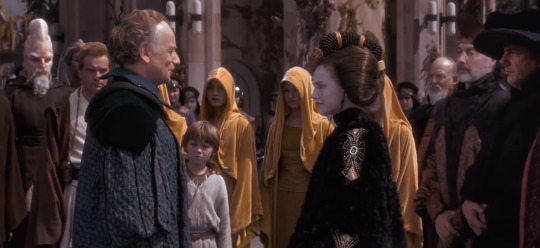












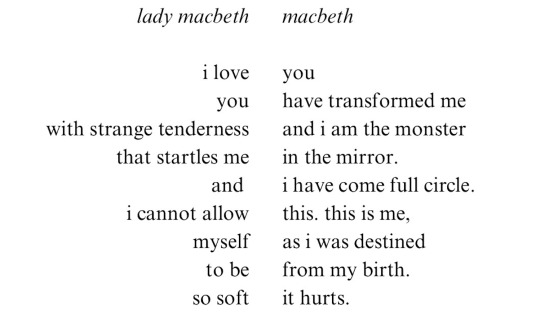






two spent swimmers
“the skywalker suicides part i: the case for padme” / the phantom menace DVD commentary / macbeth act i, scene 2 / gregory orr / early concept art of anakin and padme by iain mccraig / “lady macbeth + macbeth” - two-bees-poetry / valerie estelle frankel
#was talking The Body/padme as lady macbeth with the mutuals and neededdd to make this#(i hope ppl realize i am including that “dysfunctional role models” quote a lil tongue in cheek.)#abuse tw#<just in case#padme amidala#darth vader#anakin skywalker#anidala#prequel trilogy#revenge of the sith#star wars prequels#my essays#web weaving#star wars
860 notes
·
View notes
Text
Wei Wuxian: The Untamed Hero
Wei Wuxian had to be killed even if:
1. He carried his sword
2. He didn't use gui dao
3. He didn't create Yin HuFu
4. The Wen remnants were not in the plot
Then, why? The reason is here, voiced by Jin Zixun of all people:
Wei WuXian, you are too bold! Did the LanlingJin Sect invite you today? And you dare run wild here. Do you really think that you’re invincible, that nobody has the courage to confront you? Do you want to overturn the Heavens?”
Wei WuXian smiled, “You’re comparing yourself to the Heavens? Excuse my language, but your face is a little too thick, isn’t it?”
So, you see, this untamed heart can only meet with tragedy as the world is unrighteous, as those who are in power think their actions cannot be contested (and they often aren't!), and that their words are like the law. How many times have we seen, a convicted powerful person escape the justice system? Far too many. And how many times innocents or victims were framed for crimes? Also too many. People like Wei Wuxian aren't condemned by fate, but rather, being born into a world where the "heavens" are those who are powerful and corrupted, he very well might be destined to live tragically, along with others of his type.
Returning to the matter of this particular scene: on one hand, the Jins throw private banquets, gilded with gold. The major scandals are: Jin Zixun is forcing the Lans to drink alcohol! You see, Lan Xichen can't outrightly refuse, so he is trying to be polite about his rejection. Jin Guangyao is trying to reason and excuse, and distract. The crowd spurs Jin Zixun on, wanting to see the Lans drink for once and fall to their level.
Everyone is in their own fine little world, doing their niceities in their golden halls drinking expensive wine, admiring pretty women, gasping at scandalous behavior, asking for favour, gossiping etc.
And then Wei Wuxian walks in. Uninvited. He simply drinks the wine himself, before demanding these people to spare him their time for real wordly issues, such as deaths, debts, cruelty, the parts that society wishes to hide. A few scenes later, we are shown with much description, just how terrible Qiongqi Path is. That's the Jin's backyard. You see their achievements that are drawn on those big walls? We see the reality of the people making them.
Now, let us come to another incident. Think of the soup incident. I fully expect before Wei Wuxian came into the scene, people were simply gossiping, uninterested in finding out what was going on, why Lady Jiang is crying. Then, Wei Wuxian comes and realizes Jiang Yanli who never really cries... was crying, and firstly decides to beat the shit out of Jin Zixuan. Secondly, he understands the whole truth, beats Jin Zixuan up for humiliating his Shijie, and also makes the other girl face responsibility.
Although his shijie had an easy temper, except for how they cuddled and cried together the day the three of them reunited after Lotus Pier was destroyed, she hadn’t really shed many tears in front of others, much less cry so loudly, so pitifully in front of so many people. Wei WuXian was filled with panic. As he tried to ask her, Jiang YanLi was crying so badly that she couldn’t even speak properly. Then, when he saw Jin ZiXuan standing on the side, astonished, he fumed with anger, wondering to himself why it was the dog of a person again. With a kick, he pounced on Jin ZiXuan. The fight between the two would have alerted the Heavens. All of the cultivators around the base came to break up their fight. Amid the ruckus, he finally understood what was the cause of all this, and became even more angered. He spread his tough talk, saying that one day he’d definitely make Jin ZiXuan die in his hands, he told people to drag out the cultivator woman.
A round of questions later, the truth emerged, and Jin ZiXuan’s entire body was frozen. No matter how much Wei WuXian continued to curse at him, he returned neither words nor fists, his face dark. If not that Jiang YanLi held up her hand a while later, while Jiang Cheng and Jin GuangShan came to pull Wei WuXian away, it was likely that even now Jin ZiXuan wouldn’t be able to attend the hunt of Phoenix Mountain.
See.
The point is, perhaps, people feel Wei Wuxian's actions are unnecessary. But imagine if he wasn't there! The consequences as I predict them will have been:
1. Jiang Cheng who doesn't want to upset a prominent clan would've grumbled and cursed underneath his breath, but eventually just moved away from the ruckus and taken his sister away.
2. Perhaps the truth would never have been found out, unless Jin Zixuan later searched by himself.
3. Thus, Jiang Yanli's reputation would be stained for the years to come.
It's because Wei Wuxian dared that the truth was revealed. I took this small incidents simply to highlight this, without the addition of more factors. In the book, often, it might seem like people are trying to stop him from creating trouble. You might often wish, ugh, this is going to be so bad... The point is Wei Wuxian knows! He's not stupid, he knows of the consequences of his actions.
But he isn't the one creating trouble. It was already created by the likes of those very people who try to stop him from investigating deeper. The trouble in question is that immoral and unrighteous words and actions and decisions have already been made. Society tries to hide them. If you can't see it, it's not there. Yet, even if it is not visible, a crime has its traces and it will bleed into their world sooner or later.
Wei Wuxian forces people to snap out of their comfort zones. He doesn't care for the barriers they set around themselves. Here are some examples to explain what I mean by these barriers:
Who dares hit Jin Zixuan, who's the only heir of LanlingJin, even when he deserves it? Protected by his status, his birth, his clan who dares? Wei Wuxian does.
Who dares to annoy Lan Wangji, the second jade of Lan, who from birth is considered otherwordly, strict, immovable, rigid, untouchable and protected by his extreme cold aura? Wei Wuxian dares.
Who dares to enter cultivation society without even wielding sword, without even cultivating a core? Wei Wuxian!
Since time unknown, treasures have belonged to the powerful sects: The Lan Clan and their library, their many secret techniques. The Jin clan and their treasures, their gold. The Nie Sabres. The Zidian. Yet, a son of a servant somehow ends up possessing the most powerful treasure all by his own! Everyone goes to this popular refinery, some famed blacksmith, or that popular sect to get specially created spiritual weapons, yet Chenqing, one of the most powerful weapons, was forged alone by Wei Wuxian during his 3 months in the Burial Mound!
Since years, the cultivation world has taken to heart rules of Lans, words of the powerful sects, and their leaders! Then, once again, this orphan child comes and bends the world and changes the cultivation society forever! Yiling Laozu said that... Yiling Laozu created... Yiling Laozu's manuscripts...
His words literally become the law.
Think of how 13 years after Wei Wuxian's death when "all was peaceful" despite us knowing very well, just how much shit happened after his death - slaughter of minor clans, deaths of two prominent sect leaders, xue yang etc (because, you know, most of it was purely accidental, kept hush-hush, or the victims were people who weren't important), he comes back to life and in a matter of a couple of months, upends the cultivation society again.
The "problem" is that this guy simply doesn't conform. The problem is that he is better. The problem is that he is not unnecessarily humble about it, despite his origins. He doesn't seem to treat himself as an outlier, but an equal. (That's why I hate insecure Wei Wuxian, like this guy is righteous enough he won't even treat himself badly.) The problem is that all those barriers - social classes, power, the locked doors - they won't keep him away.
Even if he was only the Jiang Da-shixiong with a bright golden core, he will still not be a conformist. To those who aren't used to having their decisions questioned, he is their worst enemy. To whose who are used to talking in circles, spreading rumors, he is asking them. What source do you have? What is the factual evidence behind what you are saying? Why are you saying this now?
Think of how he cross questioned a petty seller selling Yiling Laozu portraits in Qinghe, and how he questioned the gathered cultivation sects in Lotus Pier during Sisi and Bicao's intervention with the same sort of attitude. Surely, there was a major class difference, power difference between the two. Yet, they don't matter to him. What matters is the truth.
So, no matter what, when the people who are in power, start having too much dirty laundry and corpses in their backyards, he will definitely know. For this guy, knowing isn't enough - he will get to the crux of the issue. The problem is, he even has the skill for it. He has the ability. One also can't distract him with offers, promises, gifts, riches, status, women. He doesn't care for any of that. He perhaps might even hate one's victims. Yet he will stand up for them.
Of course, those who are in power, all smile at each other. They understand things sometimes have to be done. People sometimes have to be silenced. "We know better."
Then, Wei Wuxian comes in and says, actually you don't. He comes in with factual accounts, evidences, forces you to face your misdeeds. Says you're all a bunch of hypocritical people. No, perhaps what is worse is that he will make you realize that's what you are! Because he's got to be good at talking, too! He's not going to act on anger or be stunned in fear.
So, now you have someone who's not only digging into your evil deeds, someone who's capable, who's not easy to persuade, but also someone with high emotional intelligence who can play the same role as you do, of being a noble, accepted gentlemen with immaculate manners, of very high literacy and outdo you. Because this guy knows very well how society works, he can comprehend social cues perhaps better than you can. He can use your own polite words and nature against you.
It's precisely because of this he must be killed. Perhaps, in every world, Wei Wuxian will end up being the victim. It's only that in MDZS, these were the particular circumstances, and those were the particular excuses.
My personal take is: sometimes it is good to be a centrist, and hold everyone's better intentions in mind. most of the times it might not be, as there are many conflicting systems in place that allow for true victims who are stuck. most often, the victims are always the ones who DON'T have a voice, who are brushed over as numbers of corpses, rather than people with stories. most often, kindness is shown in little action that are trampled upon by those who hold true power. most often the people who are good, who are heroes die young, or are hated and ridiculed, for speaking up for the victims. it's not right, and never will be.
if someone like wei wuxian or his presence in the book makes you uncomfortable it might be because you hold the "niceities" and the pleasantries to be of more importance than the issues at hand. just because something is too troublesome doesn't mean it is wrong. if everytime he enters the scene you're scared of what he's going to do next, you should know it's not him who is the problem but the prople who aren't doing anything who are. don't be scared of "trouble-makers." he's not erratic or spontaneous. he has considered society's standards and deemed it useless. why is that that the koi tower scene, where he is in his "yiling laozu, loss of control, threatening" moment is followed immediately by him being extremely kind to Wen qing ? it's not that he's losing control. it's that Jin Zixun wouldn't have acted and told him where the people were without him using intimidation tactics. Wei Wuxian is the one forced into bad corners by the powerful people, where he has to show his edges. Don't end up twisted the narratives. if you bite someone for a while, expect to be hit.
#wei wuxian#mo dao zu shi#mdzs#wangxian#my meta#my thoughts#cultivation world bullshit#my essays#When i first watched the untamed Wei Wuxian made me uncomfortable and scared at times#I felt uncomfortable reading the bits of his YLLZ era#and koi tower scene#ive done some introspection and grown
471 notes
·
View notes
Text
How Cherry Magic avoids romanticising self-sacrifice
Alright strap in boys, this is gonna be a long one.
Spoilers for the manga (mostly the english volumes but I will include a bit from vol 12. I'll mark it tho so yall may skip it if you don't want to be spoilered).
So in this one I want to examine how cherry magic does a great job at portraying self-sacrifice in a relationship as an actual flaw rather than a romantic ideal to aspire to. Very often you'll see characters in media putting their own needs aside for their lover. A lot of people will swoon at that because it is usually presented as proof of how dedicated they are to their partner and their wellbeing. (See... well the thai adaptation actually).
But what has pleasantly surprised me is how Toyota handles this in her manga.
Starting from the beginning, we all know the millions of things Kurosawa did for Adachi to get closer to him. After all, that is what's usually expected of him if we talk traditional gender roles. But one of the reasons Adachi even starts falling for Kurosawa is because of how he was for once able to do something for him.
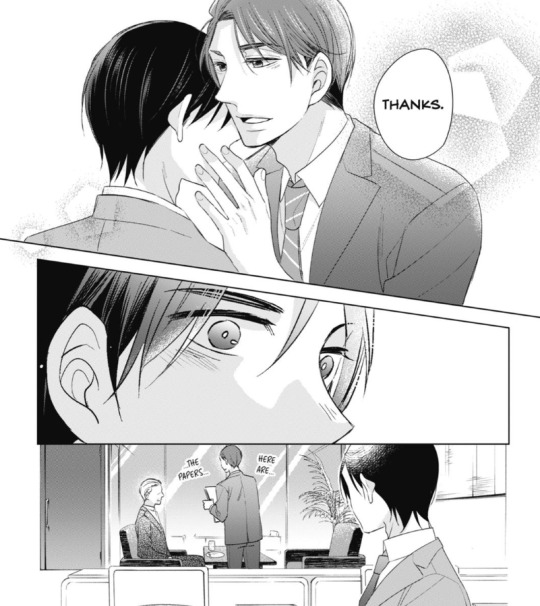
For someone with very low self-esteem, being able to help this super-capable perfect man is a big boost in confidence and also raises his own selfworth.
So now let's look at a few instances of selfless action and the consequences resulting from them.
First one is the disaster-date in volume 4
Kurosawa does his very best to choose activities that he thinks Adachi will enjoy. That is his primary concern.

The effect this has on Adachi though is that the gap between them feels impossibly wide, only worsening his already low opinion of himself.
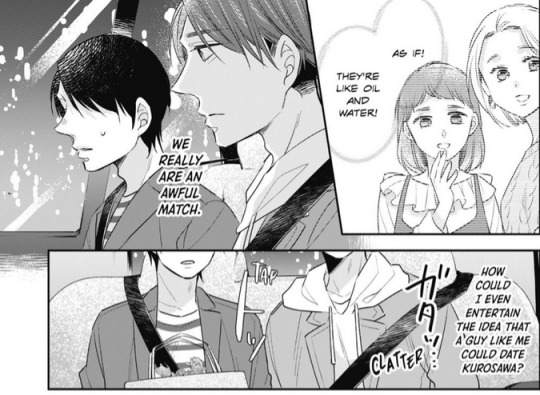
Whenever Kurosawa does something big, it makes Adachi feel that much smaller. That's why he'd rather them be equals in everything instead of one giving more than the other.
Next is the argument they have in volume 8
Kurosawa attempts to, very selflessly, protect Adachi from his lowkey homophobic parents. He doesn't want them and their opinions to hurt Adachi personally, so he ends up lying to him to keep the peace. The effect this has on Adachi though is disastrous. At first he's just generally worried about why Kurosawa would even lie to him in the first place, but then they have that fight in their living room and you really get a good look at how negatively this affects Adachi.
The very first conclusion he jumps to is that he's not doing good enough for Kurosawa to feel secure with him.
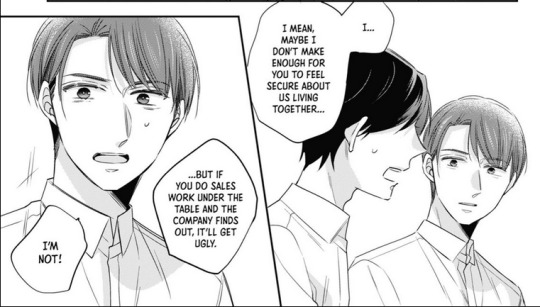
The next one is even worse, where he thinks he's not good enough in general. Both of these show how when pressed, he will default to blaming himself, believing that he is the problem first and foremost.
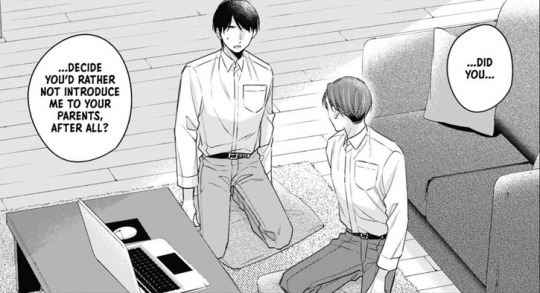
And then, if all of that wasn't bad enough, this happens next:
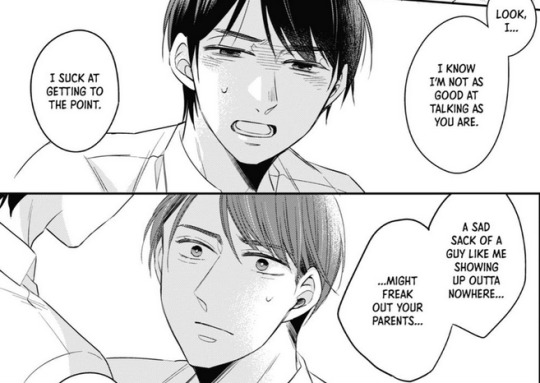
He's actually being self-deprecating again, something he hadn't done ever since Kurosawa told him not to in volume 5. And yes you can actually go back and check for yourself. Whenever he has negative thoughts after this point he's always pushing back.
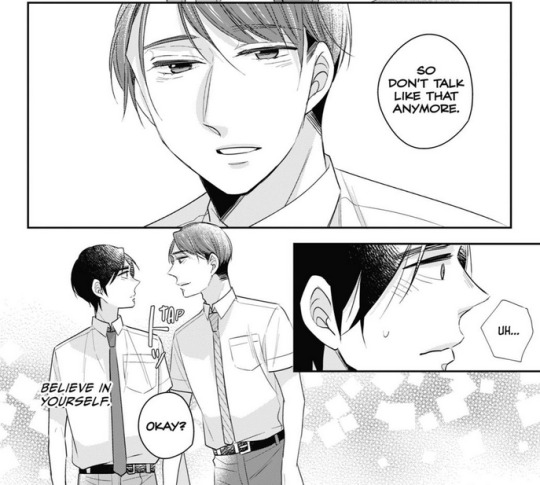
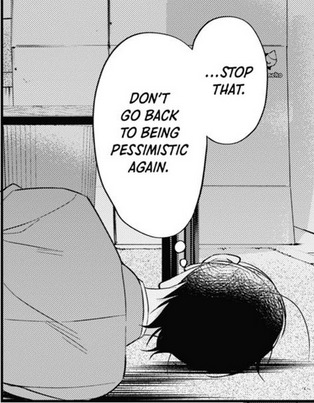
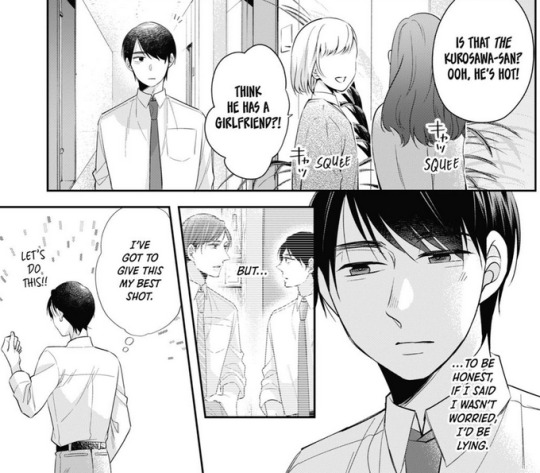
So there's an escalation happening here, one that is entirely caused by Kurosawa not sharing his burdens with him, by making their relationship unequal.
I think it also hurts him extra bad because they've had this argument before, just with their roles switched.

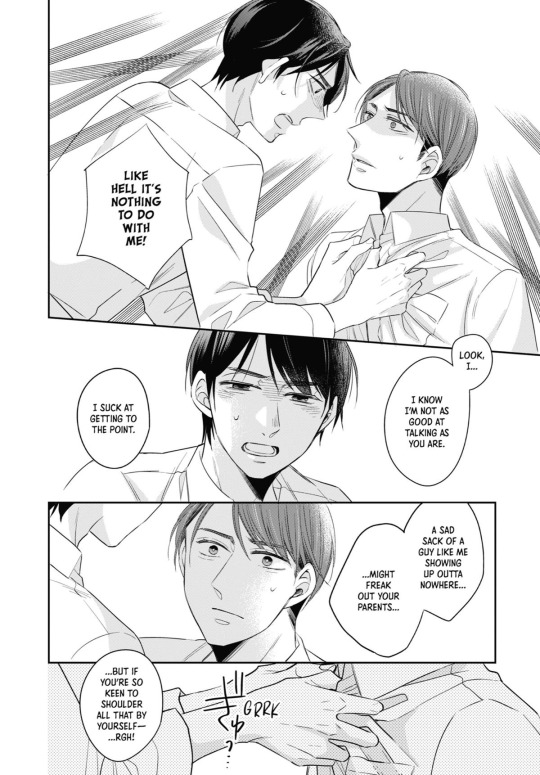
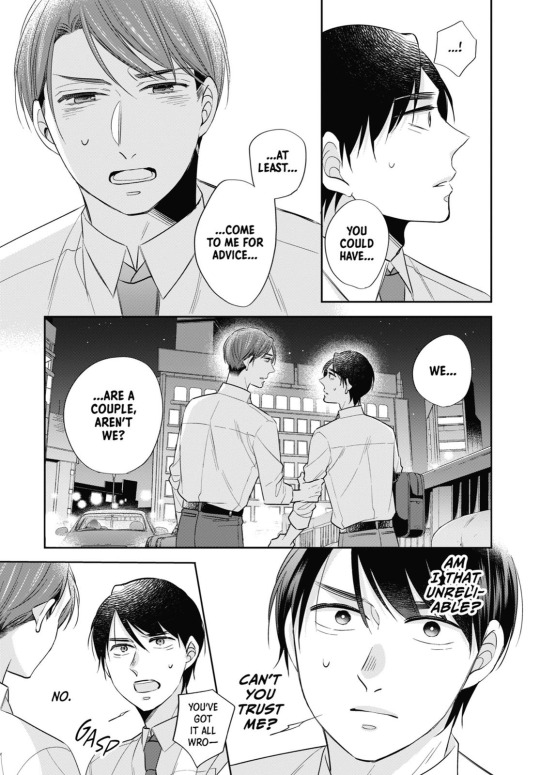
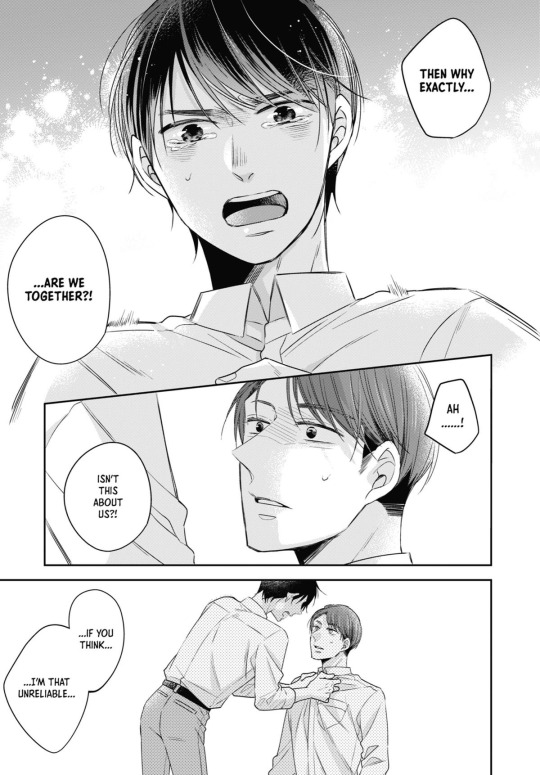
So to him it must feel like Kurosawa is betraying the important lesson Adachi learned from that argument, which is that communicating with your partner is important, even when you feel like it might hurt them.
There's also something to be said about how most people would've probably stopped prodding when someone says "it's something I can't tell you", but Adachi knows that Kurosawa has a pattern of hiding his issues from him thanks to the mind reading, which is the whole reason they had that argument in vol 6 in the first place.
So, to summarize: Whenever Kurosawa acts selfless it takes a toll on Adachi's mental health. Because of his low self-esteem he needs to feel on equal terms with Kurosawa to be able to see himself as worthwhile. (And obviously he also loves Kurosawa and doesn't want to see him in pain just in general.)
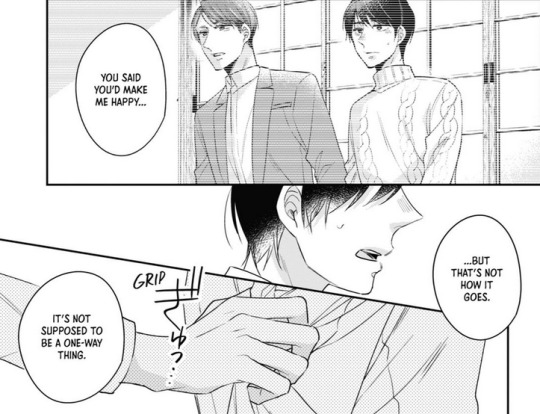
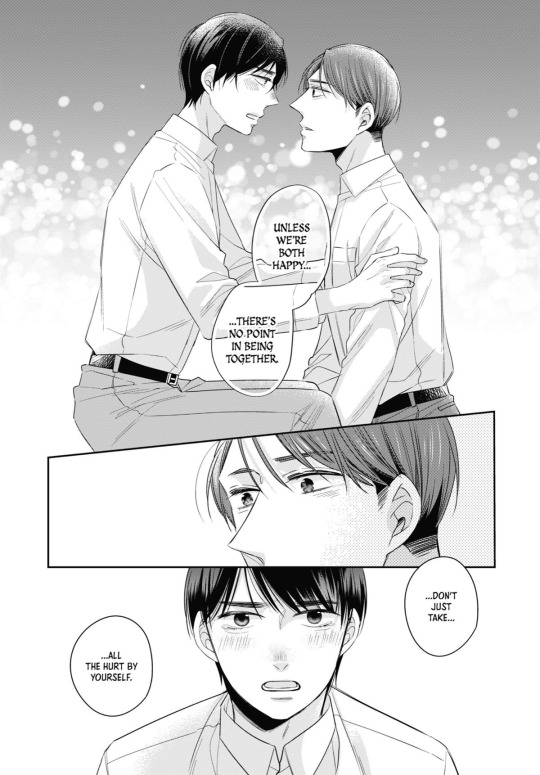
So after all that, surely Kurosawa would have learned his lesson, right? Surely he wouldn't just do it again, right?
... Spoilers for volume 12 start here ✨
So volume 12 is all about Kurosawa overworking himself because he's been assigned this big project by their chief to oversee their company's spot at a stationery convention. (I didn't look up whether or not that's a real thing but it is in the manga universe I guess lmao.)
Adachi tries to help alleviate his burdens with mixed success.

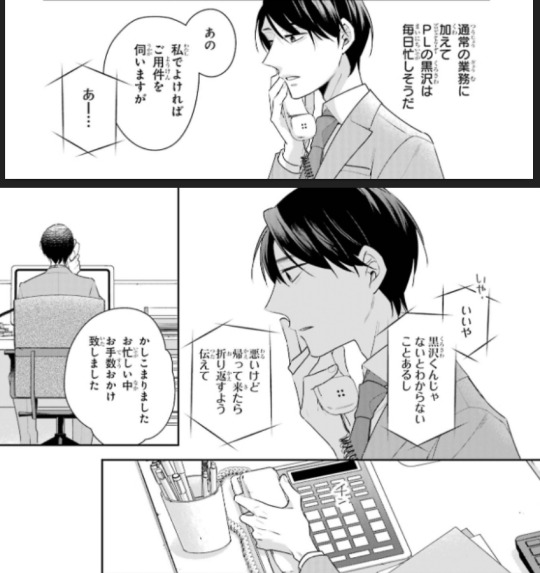
(On the left he feeds Kurosawa because he needs to finish his work and doesn't have time to eat. On the right he tries to take a phonecall for Kurosawa but gets told that Kurosawa needs to hear it personally so relaying a message won't do.)
Then Adachi muses to himself how Kurosawa was always helping him out in the past and how Adachi can't do anything for him in return, especially since they're in different departments. He feels very useless, which is once again bad for his mental health.
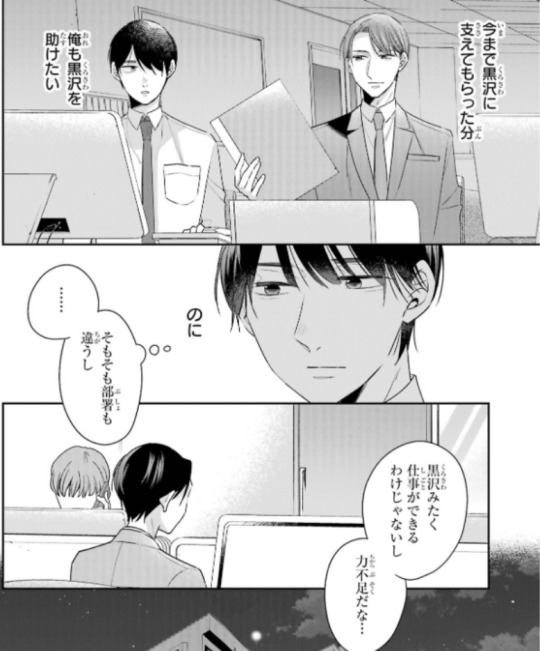
Later at home, he offers to at least take over the chores for the time being, but gets told that Kurosawa actually enjoys doing chores so there's no need for him to help.
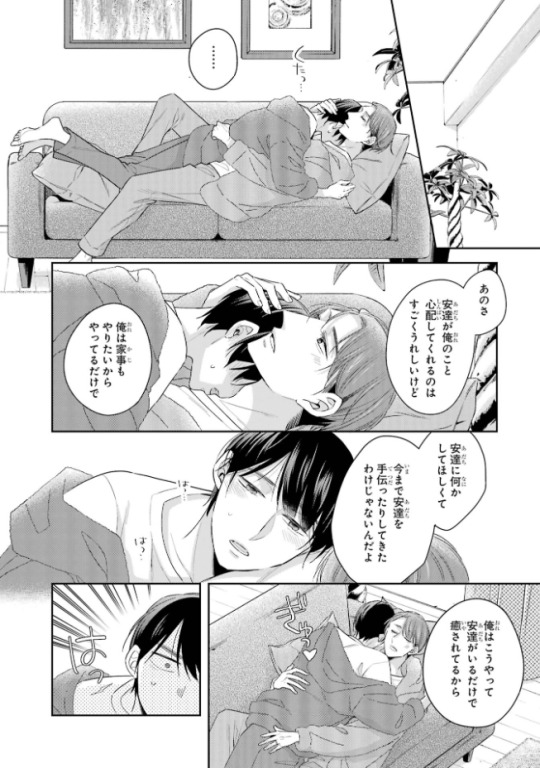
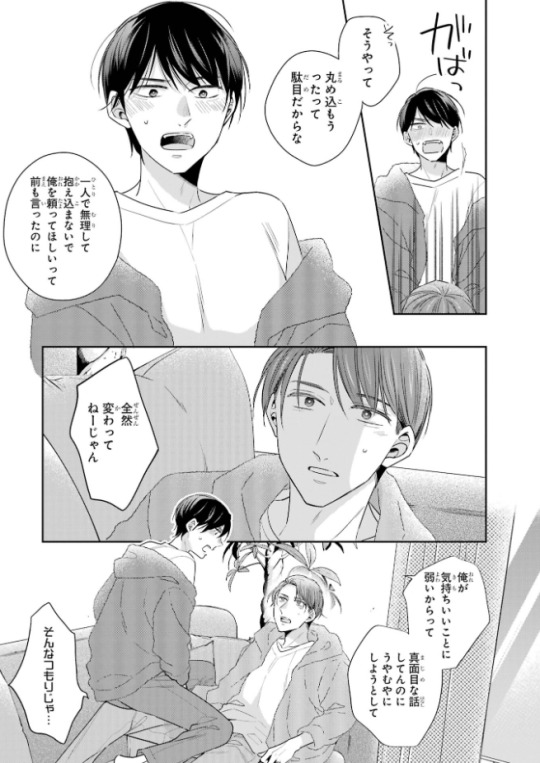
Kurosawa tells him that all he needs is Adachi to be close to him, while making out with him on the sofa. And right here we see how he only got half the lesson he was supposed to have learned in volume 8: In their fight Adachi told him that they should both be happy and he should share "all the hurt" with him, too. Well, the simple solution to that is not to see all his burdens as burdens, then he's not hurting and Adachi doesn't need to bother fussing over him! Win-win. Epic mind gymnastics 😎 (To be honest, I feel like this is actually very relatable to people that tend to give more than they take. We get so used to the weight of the burden that we don't notice it slowly pulling us down.)
So Adachi obviously notices what's going on and berates him about not having understood anything he said from that fight.
Throughout the volume Kurosawa gets more and more overworked, makes mistakes and is confronted with unexpected complications. He's very adamant about not asking anyone for help though, stating that he "can't be bothering his senpais any more than he already has" and that he's "doing this all for the sake of his future with Adachi".
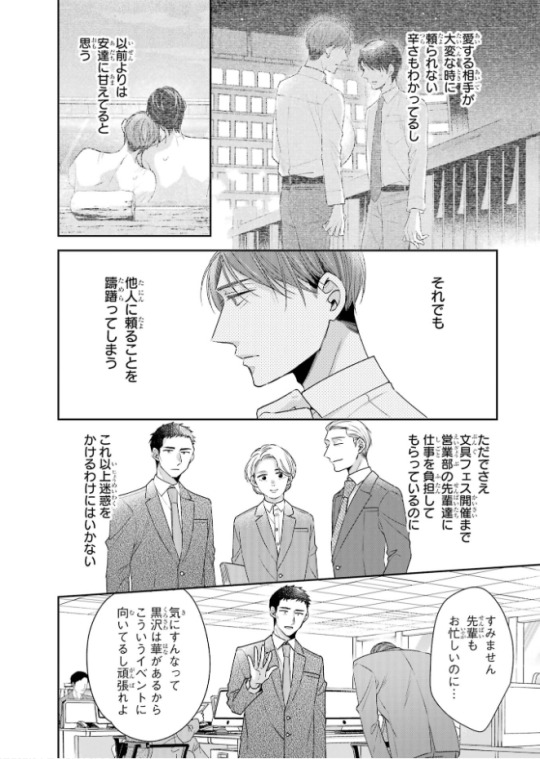
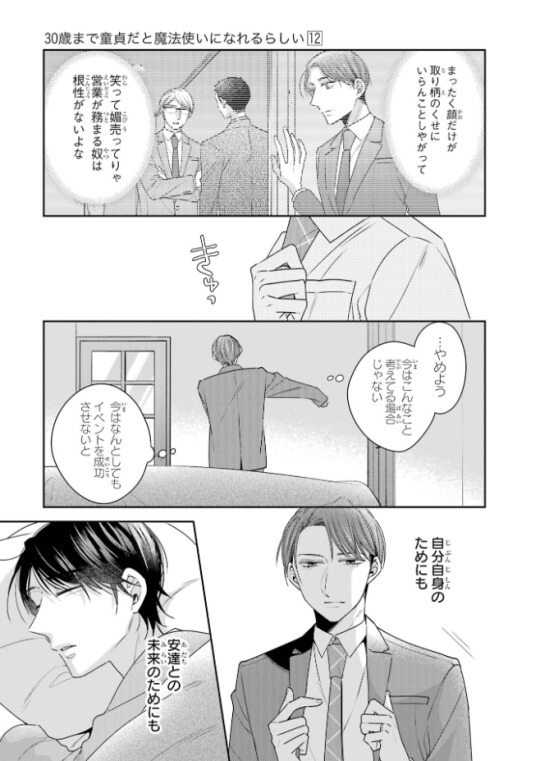
He also still has some hangups about people seeing him as just a pretty face, as you can see in that flashback in the second page. He constantly feels the need to prove himself to others, which prevents him from ever seeking out help.
So when he inevitably reaches his limit, Adachi is finally able to be there for him, being the only one that sees through his facade.
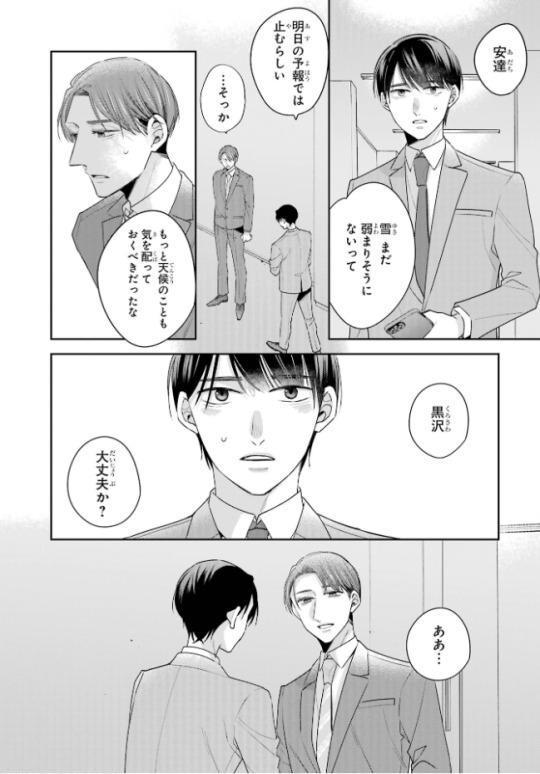

(That hand kiss is so precious 😭)
Also, on that first page Adachi asks him whether or not he's fine, which reminds me of this panel from volume 6:
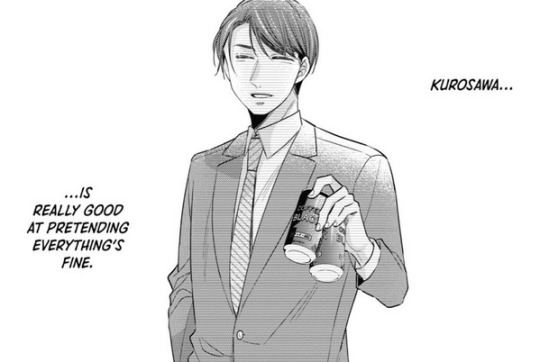
He really knows him so well.
Emboldened by his husband, Kurosawa finally does ask for help and is, of course, met with understanding and sympathy.
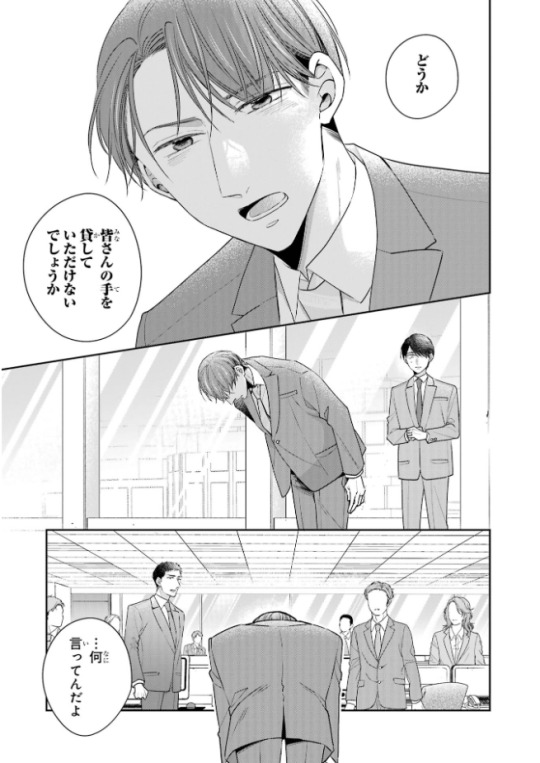

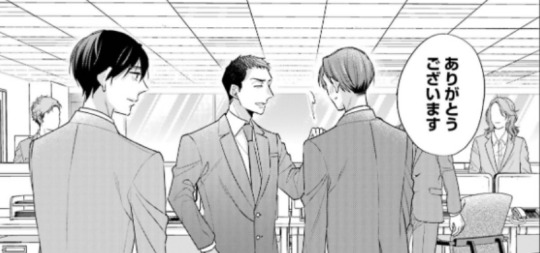
.
Spoilers for volume 12 end here ✨
So all this to say: Sometimes, when we try our best to be selfless and to protect the people close to us, we do more harm than good. Sometimes we cause harm to others (see volumes 4 and 8) and sometimes we cause harm to ourselves (see volume 12). It is of course a noble cause but it's not something to strive for at all times and can sometimes be actually counterproductive to what we wanted to achieve in the first place.
As someone who breaks themselves apart to help all the people around them, this aspect of the manga resonated very strongly with me and is probably the biggest reason I got so obsessed with this silly little BL romcom.
I know that this manga is not like, the best in quality. I know it's super niche and silly and cannot compare to the big popular mainstream manga with lots of depth and thought put into it, BUT.
A piece of art doesn't need to be "good" in order to resonate with people. You don't need to paint the mona lisa to reach someone and make them feel seen. You just need some sort of medium and a will to communicate something to the observer. (Something an AI could never replicate but that is a whole other discussion.)
This manga reached me when I needed it and it communicated a message that resonated with me and that is all it needed to do for me to love it to the point of obsession. 💖
Finally I'm done with this essay it is so long oh my god. If you reached the end of this, I'm so sorry. I hope you enjoyed it tho.
#cherry magic#happy pride month I guess#alternate title: adachi has 99 problems and kurosawa is all of them#he's also the solution tho so there's that lol#my essays
262 notes
·
View notes
Text
Zeb Wells was never, ever QUALIFIED to write for Spider-Man. As in, if I was hiriing for the job of Spider-Man writer, he'd never have even made it to the interview stage.
See, I'm an old geezer Spider-Man fan. I was there back in the early-mid 2000s when Wells first came onto the Spider-Man scene. That was when he was younger, fresher, more full of energy and less cynical. And even then his stories were mediocre at best, mercifully confined merely to fill-in issues here and there.
Fill-in issues that weren't even on ASM but on the side-books like Peter Parker: Spider-Man and dubiously canonical anthologies like Spider-Man's Tangled Web. Beyond that, he did occassional mini-series and one shots.
His ONE legitimately good story was the origin of J. Jonah Jameson, a single issue in which Spider-Man himself barely ever appeared. That was around 2004(ish). Zeb Wells unironically peaked on Spider-Man 20 years ago and it wasn't even a particularly high peak either. It was more like a small hillock.
Sure, he finally got to write ASM between 2008-2010 during Brand New Day, but like...who DIDN'T get to write ASM back then? It was coming out 3 times a month with a rotating creative team, amongst which Wells was never touted as one of the superstar writers. Love or hate them, Dan Slott, Mark Waid, Joe Kelly, Bob Gale, and even an out of retirement Roger Stern were who the Marvel promotional machine hyped up. Again, love or hate them, back in 2008-2010 these were BIG names to suddenly be working on Spider-Man. In other words, when Wells finally got 'promoted' he was essentially a mere fill-in writer AGAIN.
That being said, he did get one really big chance to bat when he was tasked with doing the biggest Lizard story of all time, 'Shed'. Reinventing a classic Lee/Ditko villain. Leading directly into Grim Hunt, the storyline that was the culmination of much of what BND had been building towards? Writing a story that was going to be one of the last in the BND era in fact? This was Zeb Wells' shot to make a name for himself in the annals of Spider-Man History.
And he succeeded! By which I mean 'Shed' was debated as potentially one of the all time WORST Spider-Man stories ever, and unquestionably the worst Lizard story there had ever been.
Shed was to Curt Connors what One More Day was to Peter Parker. A nonsensical plot geared towards a complete and utter character assassination. We are talking about a story with cannibalism, fratricide, potential sexual assault, vomit inducing art and egregious continuity fuck ups to the point where even the very first Lizard story directly contradicts it. This story was SO bad that even a manchild crybully troll like Dan Slott tried to walk it back, doing no less than 2 stories across 5(ish) years in which he cleaned up some of the mess Wells had left. Further repairs were applied during Nick Spencer's run, in particular during 'Hunted'. Yes, 'Shed' was so godforsakenly terrible it took multiple stories across almost 10 years to fix it.
THIS was the guy Marvel picked to be the 'main writer' during the Ben Reilly Beyond era, aka Brand New Day 2. His 'promotion' was to be brought out of Spider-Man writer's jail (where he belonged) so he could once more be the rotating writer in a tri-monthly set up. Except now he was to BND2 what I guess Dan Slott had been to BND1.
The difference being that BND1 had more writers and many/most of them had WAY more status to their names than any of the BND2 writers. Like, it is ridiculous to suggest Kelly Thompson or Saladin Ahmed in 2021 were anywhere near the Big Name status Mark Waid or Joe Kelly enjoyed in 2008. Even Slott back then, who hadn't yet become AS big as he would later (undeservedly) be, was still someone most of the fanbase had WANTED to write for Spider-Man for a good long while before then.* Wells was now simply swimming in a much smaller pond, his seniority being the microscopic edge he had over Thompson and Ahmed.
And yet, Chip Zdarsky when he took over Spectacular Spider-Man had way less experience than Wells had with the character. Nick Spencer too, he'd mostly just written a great mini-series in Superior Foes of Spider-Man. And of course, Roberto Aguirre Sacasa had never written Spider-Man when he was hired in 2006. Neither had Paul Jenkins in 2000. Neither had JMS in 2001. Love it or hate it, Marvel are not opposed to hiring new blood, untested blood even, for ASM or other monthly Spider-Man titles.
So, you have to wonder, why DIDN'T the younger guns Kelly Thompson , Saladin Ahmed or any other fresh blood take over after the Beyond era? Why CHOOSE Wells when he's been hanging around the block for about 20 years?
Incompetence? Yes...but also because it is patently obvious that NO ONE ELSE WANTED THIS JOB!
Wells was not hired because of his talent. He was hired because Marvel were DESPERATE. As they say, any port in a storm, right?
Because of their dogmatic enforcement of the post-One More Day state of affairs, because of how they treated Nick Spencer as a result of that, because of their general incompetence in running their entire company for the past 15+ years, Marvel have burned their bridges with too many creators. The anti-OMD writers don't want the job because they naturally want to undo OMD. The pro-OMD/neutral writers don't want the job because the fanbase naturally will yell at them for enforcing the post-OMD status quo. And neither want the job because the blatant interference Nick Spencer endured is gross and not worth the hassle, not when substack, indie and possibly even other editorial departments at Marvel/DC are options for them.
Shit, when you really think about it, Zeb Wells isn't the fundamental problem. He is just the latest symptom of it.
*Not me. In 2008 I wasn't opposed to Slott writing ASM per se. But his work on She-Hulk and Spidey-Torch, whilst good in their own right, hadn't hypnotised me into thinking he was obviously be a great fit for ASM. Unfortunately, most people were hypnotised.
#my essays#Spider-man#zeb wells#dan slott#brand new day#asm#amazing spider man#ben reilly#peter parker
39 notes
·
View notes
Text

Quiet Saturday
Currently working on my essay for Latin class. The topic is quite unspecific, which is both a blessing and a curse. I have to write one page and hand it in by Thursday so let’s see how far I’ll get today. Took a day off yesterday and didn’t pick up my report card; sleeping properly two nights in a row gave me neither my energy nor my concentration back but I am at least not feeling dizzy anymore…Still waiting for my new schedule to be released. Finished the essay I was reading - I loved it!
#finn is studying#studyblr#high school#high school students#high school studyblr#high school senior#studying#studyspo#study aesthetic#do your homework#i have homework to do#study notes#study#study motivation#study inspiration#study blog#honest studyblr#homework help#latin class#essay writing#essay#my essays#essayposting#essay help#dark academia#academia aesthetic#saturdayvibes#day in my life#digital notes#ancient rome
25 notes
·
View notes